EGYPTIAN CURRENCY DEVALUATION AND ITS IMPACT ON THE INVESTMENTS
VerifiedAdded on 2022/08/12
|19
|5082
|18
AI Summary
Contribute Materials
Your contribution can guide someone’s learning journey. Share your
documents today.
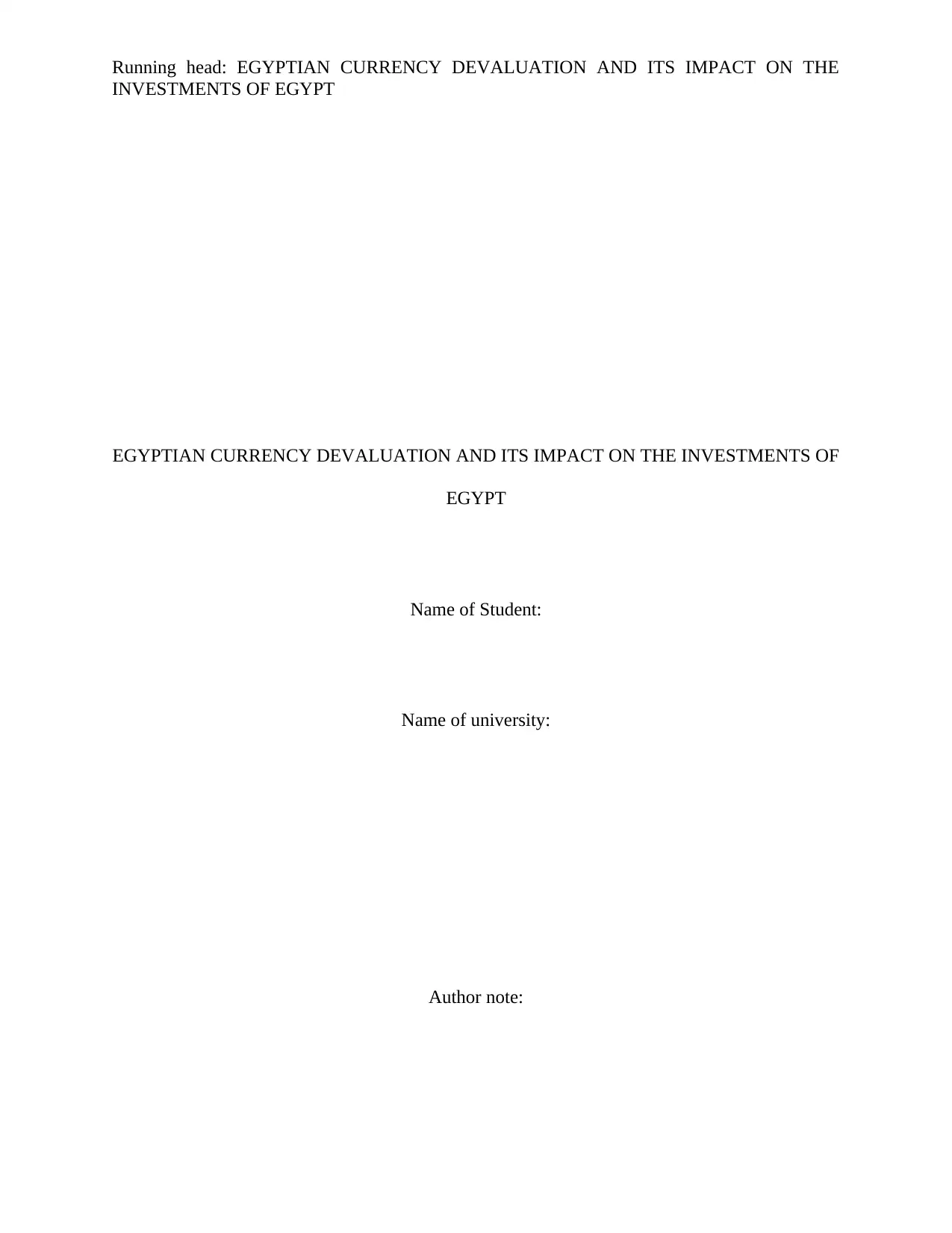
Running head: EGYPTIAN CURRENCY DEVALUATION AND ITS IMPACT ON THE
INVESTMENTS OF EGYPT
EGYPTIAN CURRENCY DEVALUATION AND ITS IMPACT ON THE INVESTMENTS OF
EGYPT
Name of Student:
Name of university:
Author note:
INVESTMENTS OF EGYPT
EGYPTIAN CURRENCY DEVALUATION AND ITS IMPACT ON THE INVESTMENTS OF
EGYPT
Name of Student:
Name of university:
Author note:
Secure Best Marks with AI Grader
Need help grading? Try our AI Grader for instant feedback on your assignments.
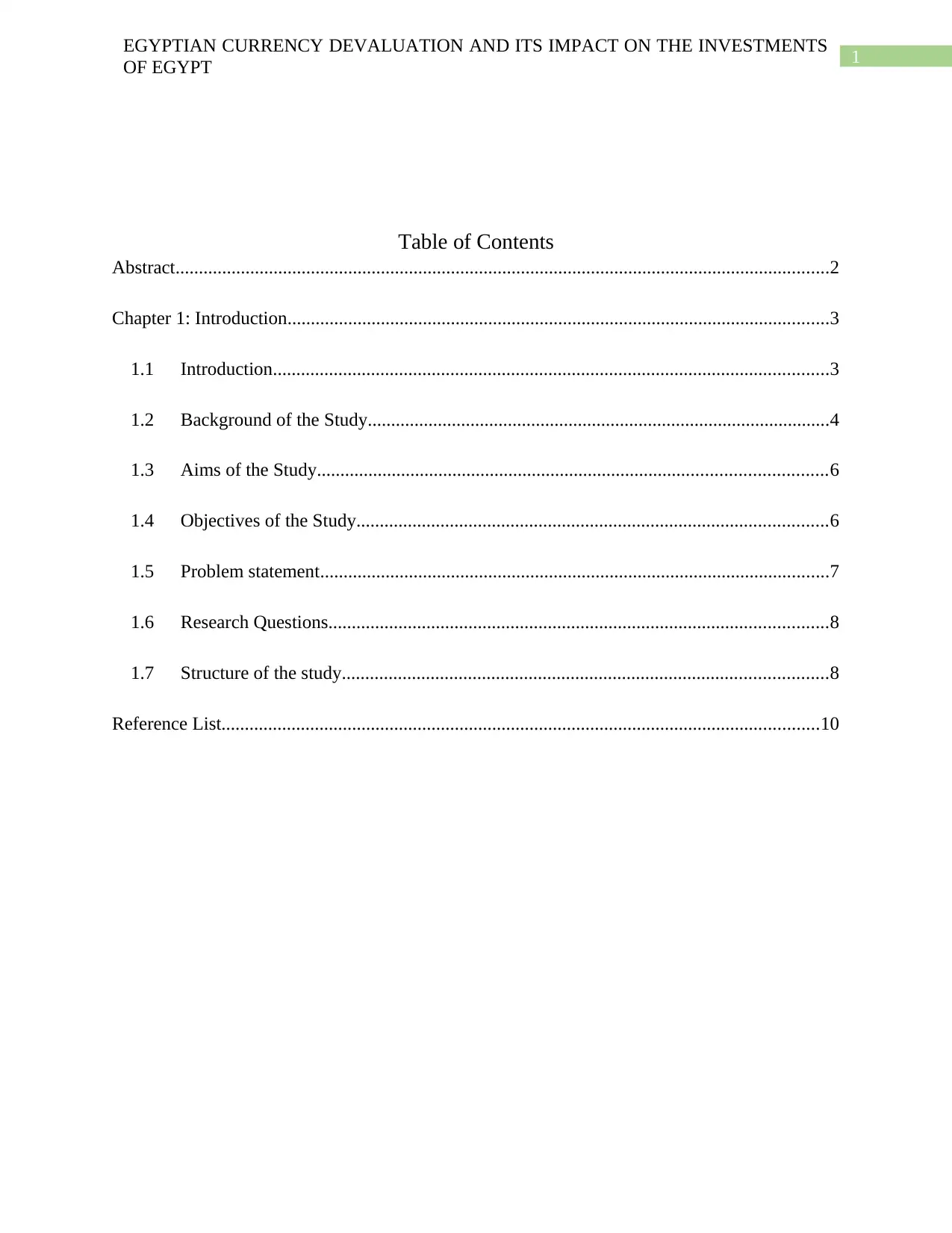
1
EGYPTIAN CURRENCY DEVALUATION AND ITS IMPACT ON THE INVESTMENTS
OF EGYPT
Table of Contents
Abstract............................................................................................................................................2
Chapter 1: Introduction....................................................................................................................3
1.1 Introduction.......................................................................................................................3
1.2 Background of the Study...................................................................................................4
1.3 Aims of the Study.............................................................................................................6
1.4 Objectives of the Study.....................................................................................................6
1.5 Problem statement.............................................................................................................7
1.6 Research Questions...........................................................................................................8
1.7 Structure of the study........................................................................................................8
Reference List................................................................................................................................10
EGYPTIAN CURRENCY DEVALUATION AND ITS IMPACT ON THE INVESTMENTS
OF EGYPT
Table of Contents
Abstract............................................................................................................................................2
Chapter 1: Introduction....................................................................................................................3
1.1 Introduction.......................................................................................................................3
1.2 Background of the Study...................................................................................................4
1.3 Aims of the Study.............................................................................................................6
1.4 Objectives of the Study.....................................................................................................6
1.5 Problem statement.............................................................................................................7
1.6 Research Questions...........................................................................................................8
1.7 Structure of the study........................................................................................................8
Reference List................................................................................................................................10

2
EGYPTIAN CURRENCY DEVALUATION AND ITS IMPACT ON THE INVESTMENTS
OF EGYPT
Abstract
EGYPTIAN CURRENCY DEVALUATION AND ITS IMPACT ON THE INVESTMENTS
OF EGYPT
Abstract
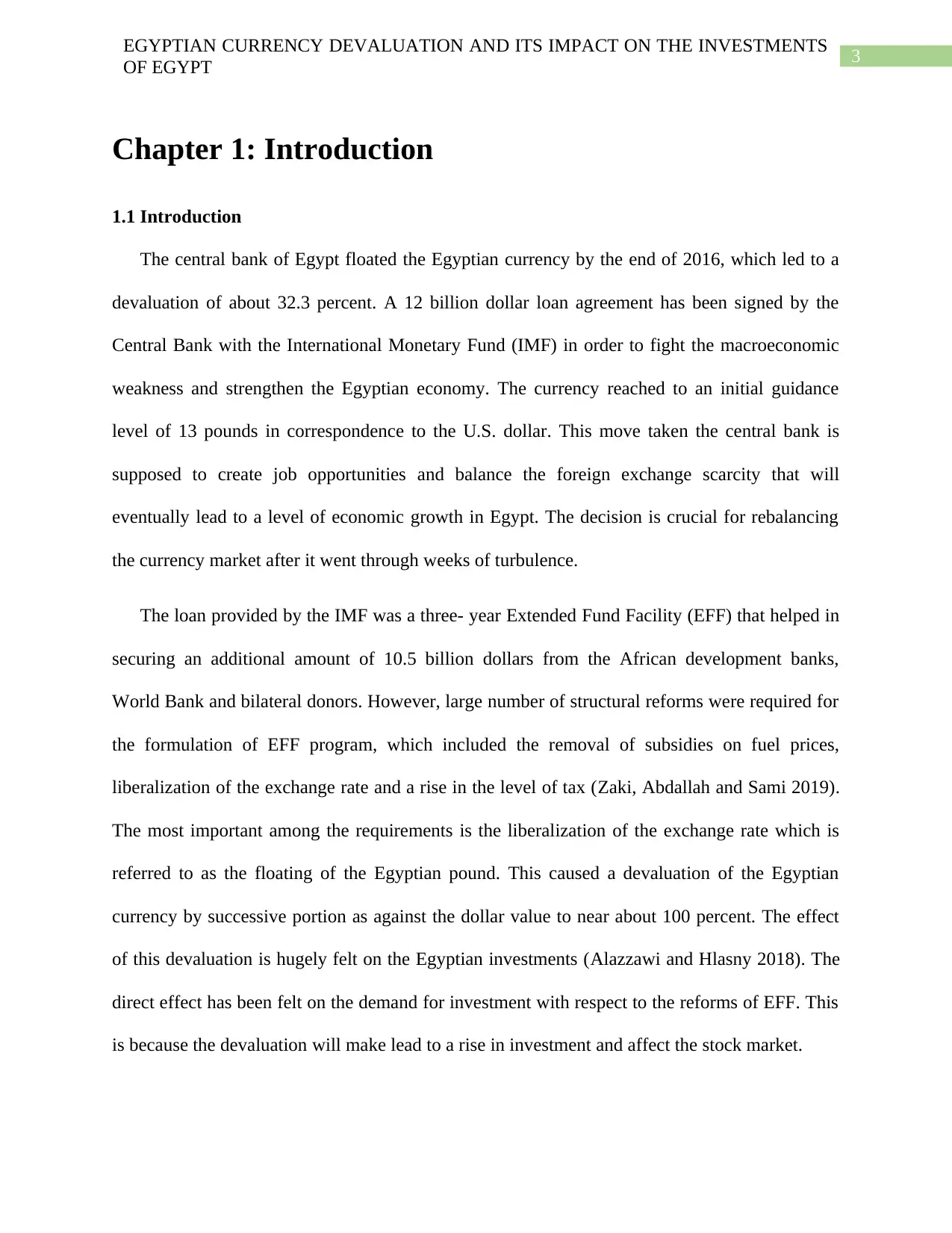
3
EGYPTIAN CURRENCY DEVALUATION AND ITS IMPACT ON THE INVESTMENTS
OF EGYPT
Chapter 1: Introduction
1.1 Introduction
The central bank of Egypt floated the Egyptian currency by the end of 2016, which led to a
devaluation of about 32.3 percent. A 12 billion dollar loan agreement has been signed by the
Central Bank with the International Monetary Fund (IMF) in order to fight the macroeconomic
weakness and strengthen the Egyptian economy. The currency reached to an initial guidance
level of 13 pounds in correspondence to the U.S. dollar. This move taken the central bank is
supposed to create job opportunities and balance the foreign exchange scarcity that will
eventually lead to a level of economic growth in Egypt. The decision is crucial for rebalancing
the currency market after it went through weeks of turbulence.
The loan provided by the IMF was a three- year Extended Fund Facility (EFF) that helped in
securing an additional amount of 10.5 billion dollars from the African development banks,
World Bank and bilateral donors. However, large number of structural reforms were required for
the formulation of EFF program, which included the removal of subsidies on fuel prices,
liberalization of the exchange rate and a rise in the level of tax (Zaki, Abdallah and Sami 2019).
The most important among the requirements is the liberalization of the exchange rate which is
referred to as the floating of the Egyptian pound. This caused a devaluation of the Egyptian
currency by successive portion as against the dollar value to near about 100 percent. The effect
of this devaluation is hugely felt on the Egyptian investments (Alazzawi and Hlasny 2018). The
direct effect has been felt on the demand for investment with respect to the reforms of EFF. This
is because the devaluation will make lead to a rise in investment and affect the stock market.
EGYPTIAN CURRENCY DEVALUATION AND ITS IMPACT ON THE INVESTMENTS
OF EGYPT
Chapter 1: Introduction
1.1 Introduction
The central bank of Egypt floated the Egyptian currency by the end of 2016, which led to a
devaluation of about 32.3 percent. A 12 billion dollar loan agreement has been signed by the
Central Bank with the International Monetary Fund (IMF) in order to fight the macroeconomic
weakness and strengthen the Egyptian economy. The currency reached to an initial guidance
level of 13 pounds in correspondence to the U.S. dollar. This move taken the central bank is
supposed to create job opportunities and balance the foreign exchange scarcity that will
eventually lead to a level of economic growth in Egypt. The decision is crucial for rebalancing
the currency market after it went through weeks of turbulence.
The loan provided by the IMF was a three- year Extended Fund Facility (EFF) that helped in
securing an additional amount of 10.5 billion dollars from the African development banks,
World Bank and bilateral donors. However, large number of structural reforms were required for
the formulation of EFF program, which included the removal of subsidies on fuel prices,
liberalization of the exchange rate and a rise in the level of tax (Zaki, Abdallah and Sami 2019).
The most important among the requirements is the liberalization of the exchange rate which is
referred to as the floating of the Egyptian pound. This caused a devaluation of the Egyptian
currency by successive portion as against the dollar value to near about 100 percent. The effect
of this devaluation is hugely felt on the Egyptian investments (Alazzawi and Hlasny 2018). The
direct effect has been felt on the demand for investment with respect to the reforms of EFF. This
is because the devaluation will make lead to a rise in investment and affect the stock market.
Secure Best Marks with AI Grader
Need help grading? Try our AI Grader for instant feedback on your assignments.
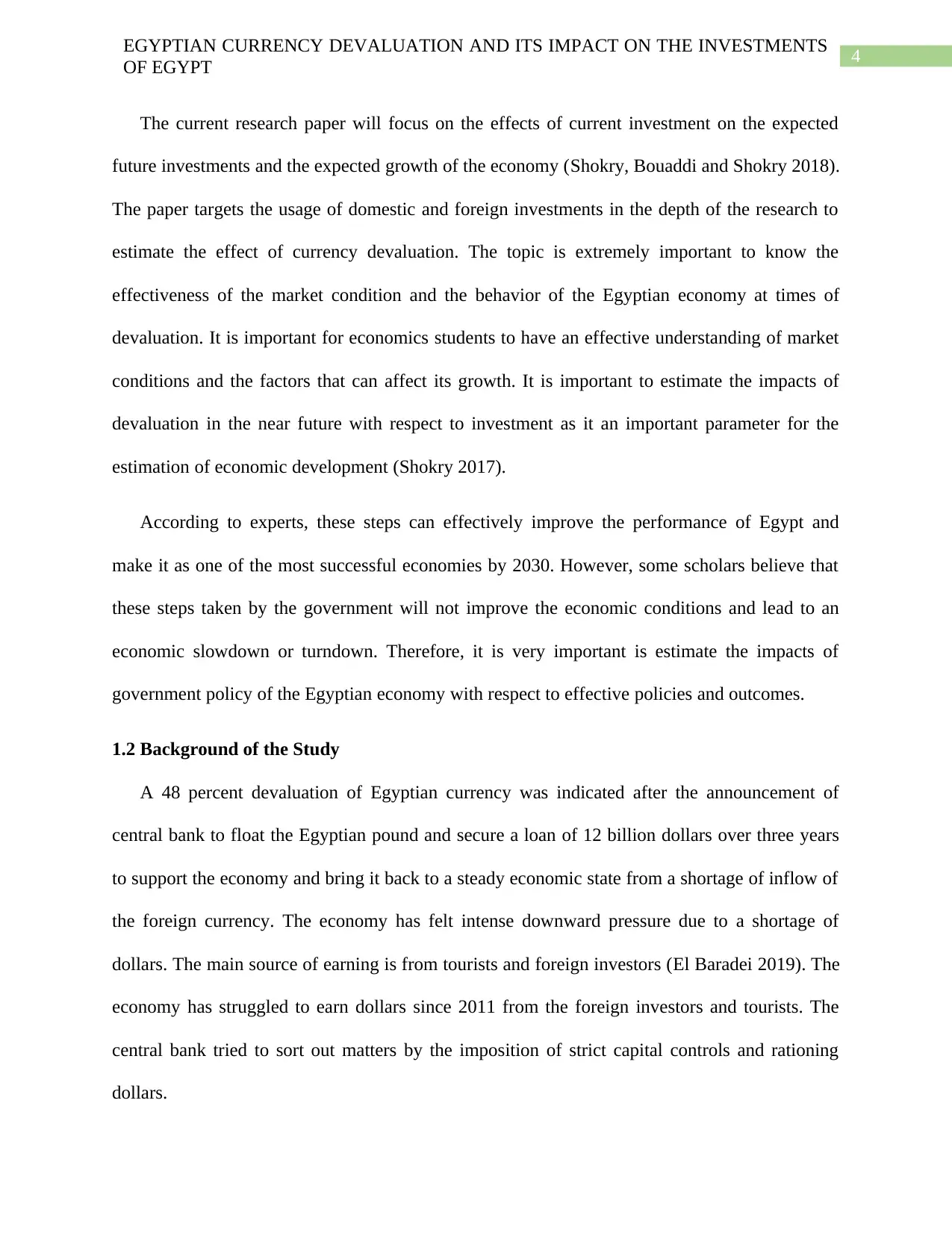
4
EGYPTIAN CURRENCY DEVALUATION AND ITS IMPACT ON THE INVESTMENTS
OF EGYPT
The current research paper will focus on the effects of current investment on the expected
future investments and the expected growth of the economy (Shokry, Bouaddi and Shokry 2018).
The paper targets the usage of domestic and foreign investments in the depth of the research to
estimate the effect of currency devaluation. The topic is extremely important to know the
effectiveness of the market condition and the behavior of the Egyptian economy at times of
devaluation. It is important for economics students to have an effective understanding of market
conditions and the factors that can affect its growth. It is important to estimate the impacts of
devaluation in the near future with respect to investment as it an important parameter for the
estimation of economic development (Shokry 2017).
According to experts, these steps can effectively improve the performance of Egypt and
make it as one of the most successful economies by 2030. However, some scholars believe that
these steps taken by the government will not improve the economic conditions and lead to an
economic slowdown or turndown. Therefore, it is very important is estimate the impacts of
government policy of the Egyptian economy with respect to effective policies and outcomes.
1.2 Background of the Study
A 48 percent devaluation of Egyptian currency was indicated after the announcement of
central bank to float the Egyptian pound and secure a loan of 12 billion dollars over three years
to support the economy and bring it back to a steady economic state from a shortage of inflow of
the foreign currency. The economy has felt intense downward pressure due to a shortage of
dollars. The main source of earning is from tourists and foreign investors (El Baradei 2019). The
economy has struggled to earn dollars since 2011 from the foreign investors and tourists. The
central bank tried to sort out matters by the imposition of strict capital controls and rationing
dollars.
EGYPTIAN CURRENCY DEVALUATION AND ITS IMPACT ON THE INVESTMENTS
OF EGYPT
The current research paper will focus on the effects of current investment on the expected
future investments and the expected growth of the economy (Shokry, Bouaddi and Shokry 2018).
The paper targets the usage of domestic and foreign investments in the depth of the research to
estimate the effect of currency devaluation. The topic is extremely important to know the
effectiveness of the market condition and the behavior of the Egyptian economy at times of
devaluation. It is important for economics students to have an effective understanding of market
conditions and the factors that can affect its growth. It is important to estimate the impacts of
devaluation in the near future with respect to investment as it an important parameter for the
estimation of economic development (Shokry 2017).
According to experts, these steps can effectively improve the performance of Egypt and
make it as one of the most successful economies by 2030. However, some scholars believe that
these steps taken by the government will not improve the economic conditions and lead to an
economic slowdown or turndown. Therefore, it is very important is estimate the impacts of
government policy of the Egyptian economy with respect to effective policies and outcomes.
1.2 Background of the Study
A 48 percent devaluation of Egyptian currency was indicated after the announcement of
central bank to float the Egyptian pound and secure a loan of 12 billion dollars over three years
to support the economy and bring it back to a steady economic state from a shortage of inflow of
the foreign currency. The economy has felt intense downward pressure due to a shortage of
dollars. The main source of earning is from tourists and foreign investors (El Baradei 2019). The
economy has struggled to earn dollars since 2011 from the foreign investors and tourists. The
central bank tried to sort out matters by the imposition of strict capital controls and rationing
dollars.
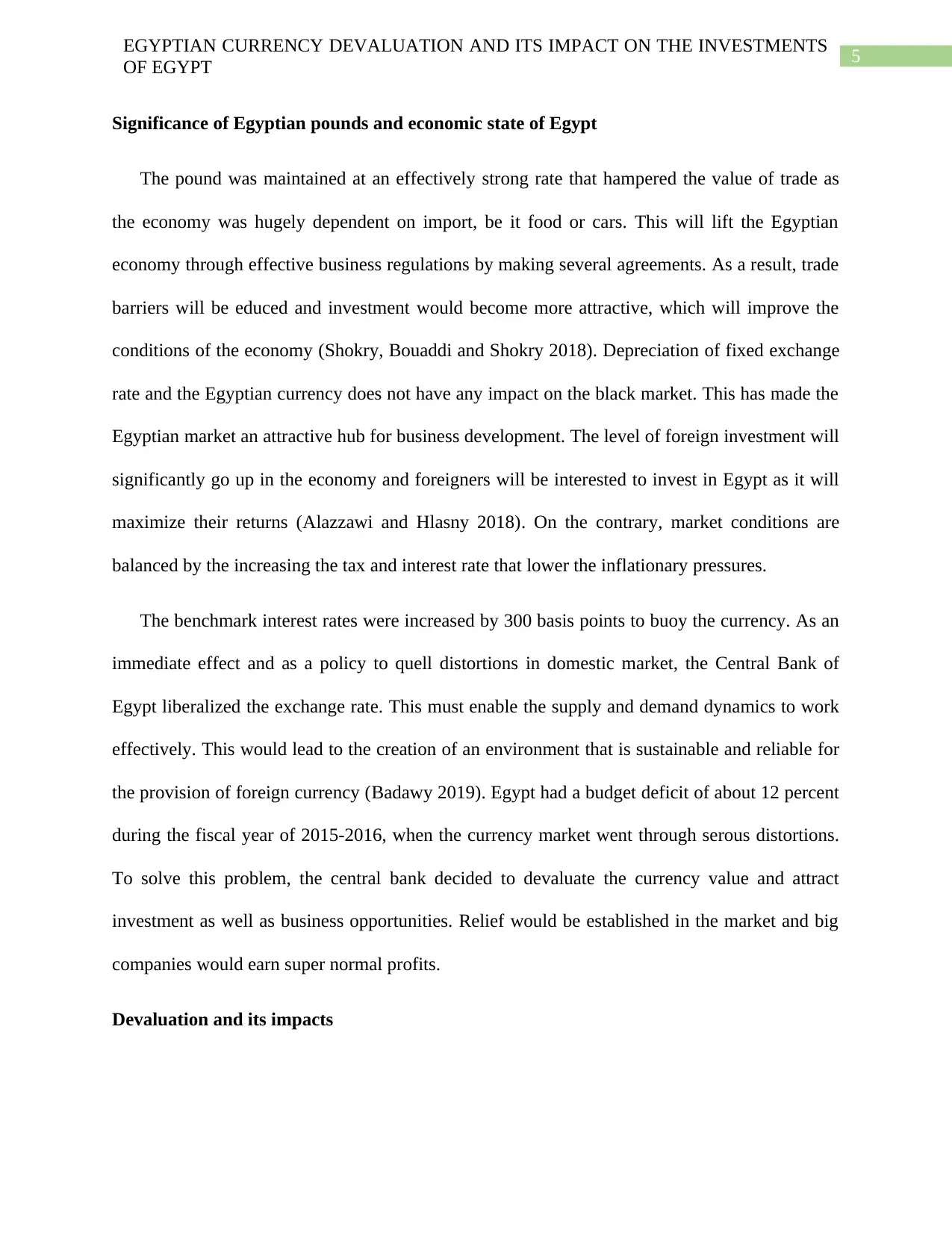
5
EGYPTIAN CURRENCY DEVALUATION AND ITS IMPACT ON THE INVESTMENTS
OF EGYPT
Significance of Egyptian pounds and economic state of Egypt
The pound was maintained at an effectively strong rate that hampered the value of trade as
the economy was hugely dependent on import, be it food or cars. This will lift the Egyptian
economy through effective business regulations by making several agreements. As a result, trade
barriers will be educed and investment would become more attractive, which will improve the
conditions of the economy (Shokry, Bouaddi and Shokry 2018). Depreciation of fixed exchange
rate and the Egyptian currency does not have any impact on the black market. This has made the
Egyptian market an attractive hub for business development. The level of foreign investment will
significantly go up in the economy and foreigners will be interested to invest in Egypt as it will
maximize their returns (Alazzawi and Hlasny 2018). On the contrary, market conditions are
balanced by the increasing the tax and interest rate that lower the inflationary pressures.
The benchmark interest rates were increased by 300 basis points to buoy the currency. As an
immediate effect and as a policy to quell distortions in domestic market, the Central Bank of
Egypt liberalized the exchange rate. This must enable the supply and demand dynamics to work
effectively. This would lead to the creation of an environment that is sustainable and reliable for
the provision of foreign currency (Badawy 2019). Egypt had a budget deficit of about 12 percent
during the fiscal year of 2015-2016, when the currency market went through serous distortions.
To solve this problem, the central bank decided to devaluate the currency value and attract
investment as well as business opportunities. Relief would be established in the market and big
companies would earn super normal profits.
Devaluation and its impacts
EGYPTIAN CURRENCY DEVALUATION AND ITS IMPACT ON THE INVESTMENTS
OF EGYPT
Significance of Egyptian pounds and economic state of Egypt
The pound was maintained at an effectively strong rate that hampered the value of trade as
the economy was hugely dependent on import, be it food or cars. This will lift the Egyptian
economy through effective business regulations by making several agreements. As a result, trade
barriers will be educed and investment would become more attractive, which will improve the
conditions of the economy (Shokry, Bouaddi and Shokry 2018). Depreciation of fixed exchange
rate and the Egyptian currency does not have any impact on the black market. This has made the
Egyptian market an attractive hub for business development. The level of foreign investment will
significantly go up in the economy and foreigners will be interested to invest in Egypt as it will
maximize their returns (Alazzawi and Hlasny 2018). On the contrary, market conditions are
balanced by the increasing the tax and interest rate that lower the inflationary pressures.
The benchmark interest rates were increased by 300 basis points to buoy the currency. As an
immediate effect and as a policy to quell distortions in domestic market, the Central Bank of
Egypt liberalized the exchange rate. This must enable the supply and demand dynamics to work
effectively. This would lead to the creation of an environment that is sustainable and reliable for
the provision of foreign currency (Badawy 2019). Egypt had a budget deficit of about 12 percent
during the fiscal year of 2015-2016, when the currency market went through serous distortions.
To solve this problem, the central bank decided to devaluate the currency value and attract
investment as well as business opportunities. Relief would be established in the market and big
companies would earn super normal profits.
Devaluation and its impacts
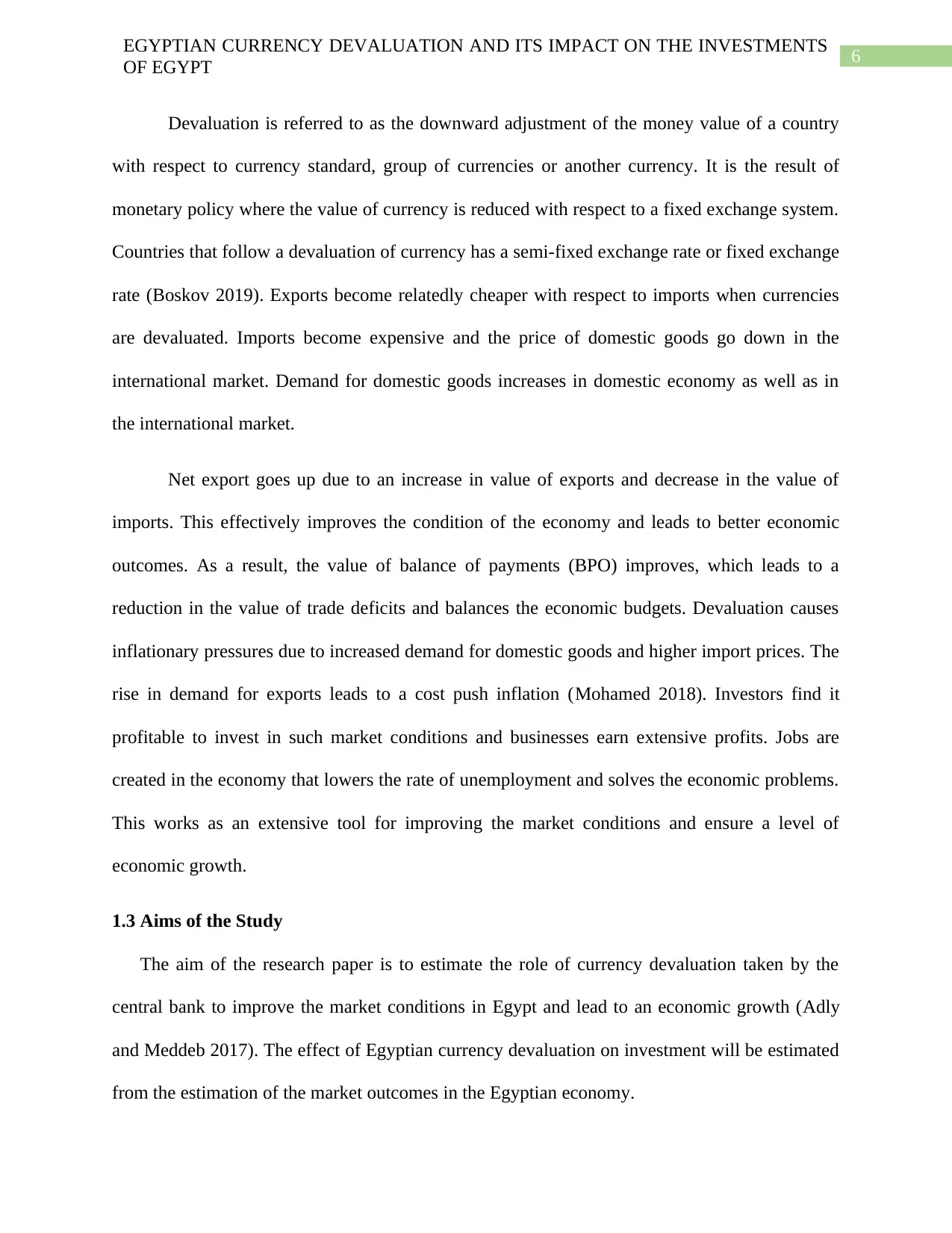
6
EGYPTIAN CURRENCY DEVALUATION AND ITS IMPACT ON THE INVESTMENTS
OF EGYPT
Devaluation is referred to as the downward adjustment of the money value of a country
with respect to currency standard, group of currencies or another currency. It is the result of
monetary policy where the value of currency is reduced with respect to a fixed exchange system.
Countries that follow a devaluation of currency has a semi-fixed exchange rate or fixed exchange
rate (Boskov 2019). Exports become relatedly cheaper with respect to imports when currencies
are devaluated. Imports become expensive and the price of domestic goods go down in the
international market. Demand for domestic goods increases in domestic economy as well as in
the international market.
Net export goes up due to an increase in value of exports and decrease in the value of
imports. This effectively improves the condition of the economy and leads to better economic
outcomes. As a result, the value of balance of payments (BPO) improves, which leads to a
reduction in the value of trade deficits and balances the economic budgets. Devaluation causes
inflationary pressures due to increased demand for domestic goods and higher import prices. The
rise in demand for exports leads to a cost push inflation (Mohamed 2018). Investors find it
profitable to invest in such market conditions and businesses earn extensive profits. Jobs are
created in the economy that lowers the rate of unemployment and solves the economic problems.
This works as an extensive tool for improving the market conditions and ensure a level of
economic growth.
1.3 Aims of the Study
The aim of the research paper is to estimate the role of currency devaluation taken by the
central bank to improve the market conditions in Egypt and lead to an economic growth (Adly
and Meddeb 2017). The effect of Egyptian currency devaluation on investment will be estimated
from the estimation of the market outcomes in the Egyptian economy.
EGYPTIAN CURRENCY DEVALUATION AND ITS IMPACT ON THE INVESTMENTS
OF EGYPT
Devaluation is referred to as the downward adjustment of the money value of a country
with respect to currency standard, group of currencies or another currency. It is the result of
monetary policy where the value of currency is reduced with respect to a fixed exchange system.
Countries that follow a devaluation of currency has a semi-fixed exchange rate or fixed exchange
rate (Boskov 2019). Exports become relatedly cheaper with respect to imports when currencies
are devaluated. Imports become expensive and the price of domestic goods go down in the
international market. Demand for domestic goods increases in domestic economy as well as in
the international market.
Net export goes up due to an increase in value of exports and decrease in the value of
imports. This effectively improves the condition of the economy and leads to better economic
outcomes. As a result, the value of balance of payments (BPO) improves, which leads to a
reduction in the value of trade deficits and balances the economic budgets. Devaluation causes
inflationary pressures due to increased demand for domestic goods and higher import prices. The
rise in demand for exports leads to a cost push inflation (Mohamed 2018). Investors find it
profitable to invest in such market conditions and businesses earn extensive profits. Jobs are
created in the economy that lowers the rate of unemployment and solves the economic problems.
This works as an extensive tool for improving the market conditions and ensure a level of
economic growth.
1.3 Aims of the Study
The aim of the research paper is to estimate the role of currency devaluation taken by the
central bank to improve the market conditions in Egypt and lead to an economic growth (Adly
and Meddeb 2017). The effect of Egyptian currency devaluation on investment will be estimated
from the estimation of the market outcomes in the Egyptian economy.
Paraphrase This Document
Need a fresh take? Get an instant paraphrase of this document with our AI Paraphraser
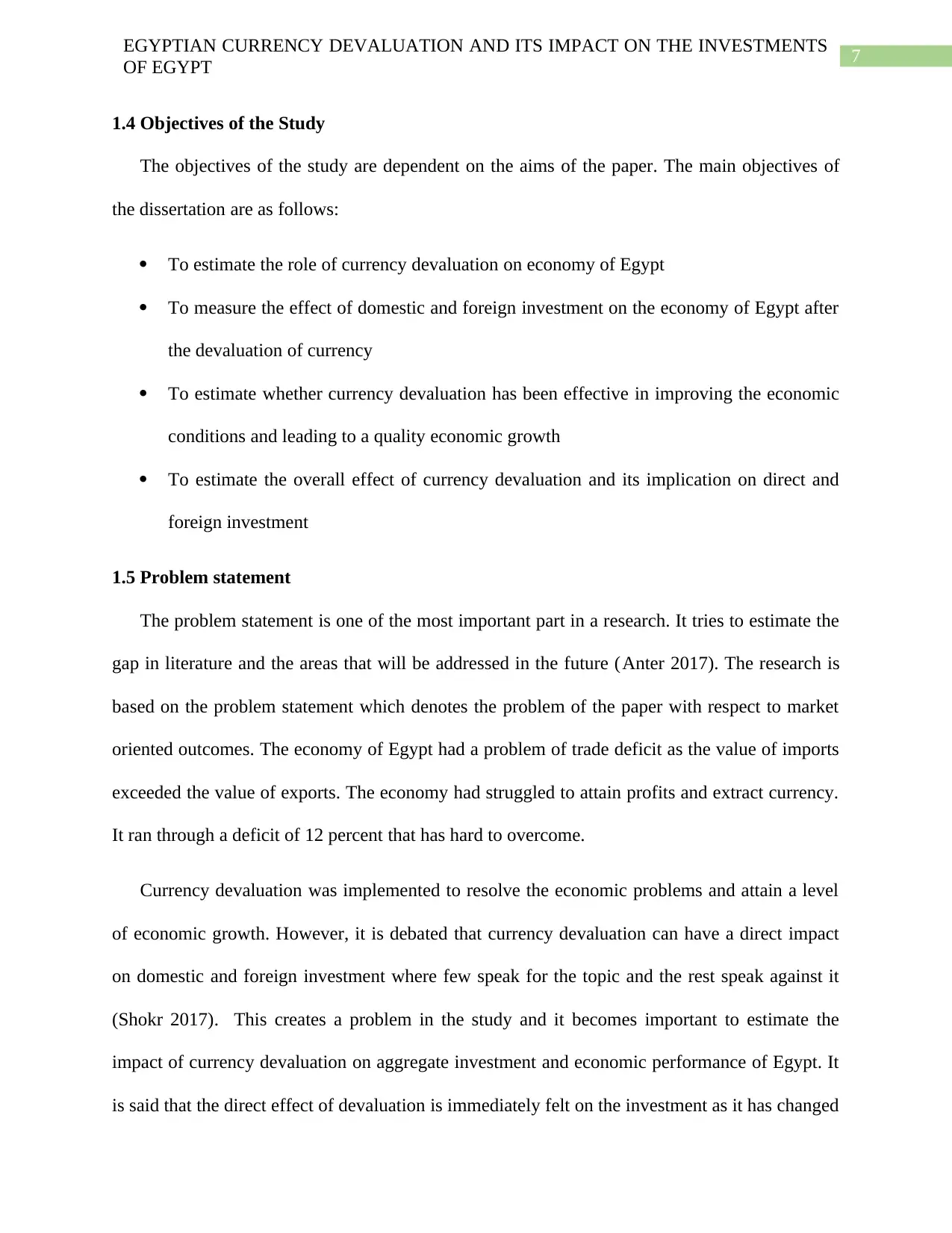
7
EGYPTIAN CURRENCY DEVALUATION AND ITS IMPACT ON THE INVESTMENTS
OF EGYPT
1.4 Objectives of the Study
The objectives of the study are dependent on the aims of the paper. The main objectives of
the dissertation are as follows:
To estimate the role of currency devaluation on economy of Egypt
To measure the effect of domestic and foreign investment on the economy of Egypt after
the devaluation of currency
To estimate whether currency devaluation has been effective in improving the economic
conditions and leading to a quality economic growth
To estimate the overall effect of currency devaluation and its implication on direct and
foreign investment
1.5 Problem statement
The problem statement is one of the most important part in a research. It tries to estimate the
gap in literature and the areas that will be addressed in the future (Anter 2017). The research is
based on the problem statement which denotes the problem of the paper with respect to market
oriented outcomes. The economy of Egypt had a problem of trade deficit as the value of imports
exceeded the value of exports. The economy had struggled to attain profits and extract currency.
It ran through a deficit of 12 percent that has hard to overcome.
Currency devaluation was implemented to resolve the economic problems and attain a level
of economic growth. However, it is debated that currency devaluation can have a direct impact
on domestic and foreign investment where few speak for the topic and the rest speak against it
(Shokr 2017). This creates a problem in the study and it becomes important to estimate the
impact of currency devaluation on aggregate investment and economic performance of Egypt. It
is said that the direct effect of devaluation is immediately felt on the investment as it has changed
EGYPTIAN CURRENCY DEVALUATION AND ITS IMPACT ON THE INVESTMENTS
OF EGYPT
1.4 Objectives of the Study
The objectives of the study are dependent on the aims of the paper. The main objectives of
the dissertation are as follows:
To estimate the role of currency devaluation on economy of Egypt
To measure the effect of domestic and foreign investment on the economy of Egypt after
the devaluation of currency
To estimate whether currency devaluation has been effective in improving the economic
conditions and leading to a quality economic growth
To estimate the overall effect of currency devaluation and its implication on direct and
foreign investment
1.5 Problem statement
The problem statement is one of the most important part in a research. It tries to estimate the
gap in literature and the areas that will be addressed in the future (Anter 2017). The research is
based on the problem statement which denotes the problem of the paper with respect to market
oriented outcomes. The economy of Egypt had a problem of trade deficit as the value of imports
exceeded the value of exports. The economy had struggled to attain profits and extract currency.
It ran through a deficit of 12 percent that has hard to overcome.
Currency devaluation was implemented to resolve the economic problems and attain a level
of economic growth. However, it is debated that currency devaluation can have a direct impact
on domestic and foreign investment where few speak for the topic and the rest speak against it
(Shokr 2017). This creates a problem in the study and it becomes important to estimate the
impact of currency devaluation on aggregate investment and economic performance of Egypt. It
is said that the direct effect of devaluation is immediately felt on the investment as it has changed
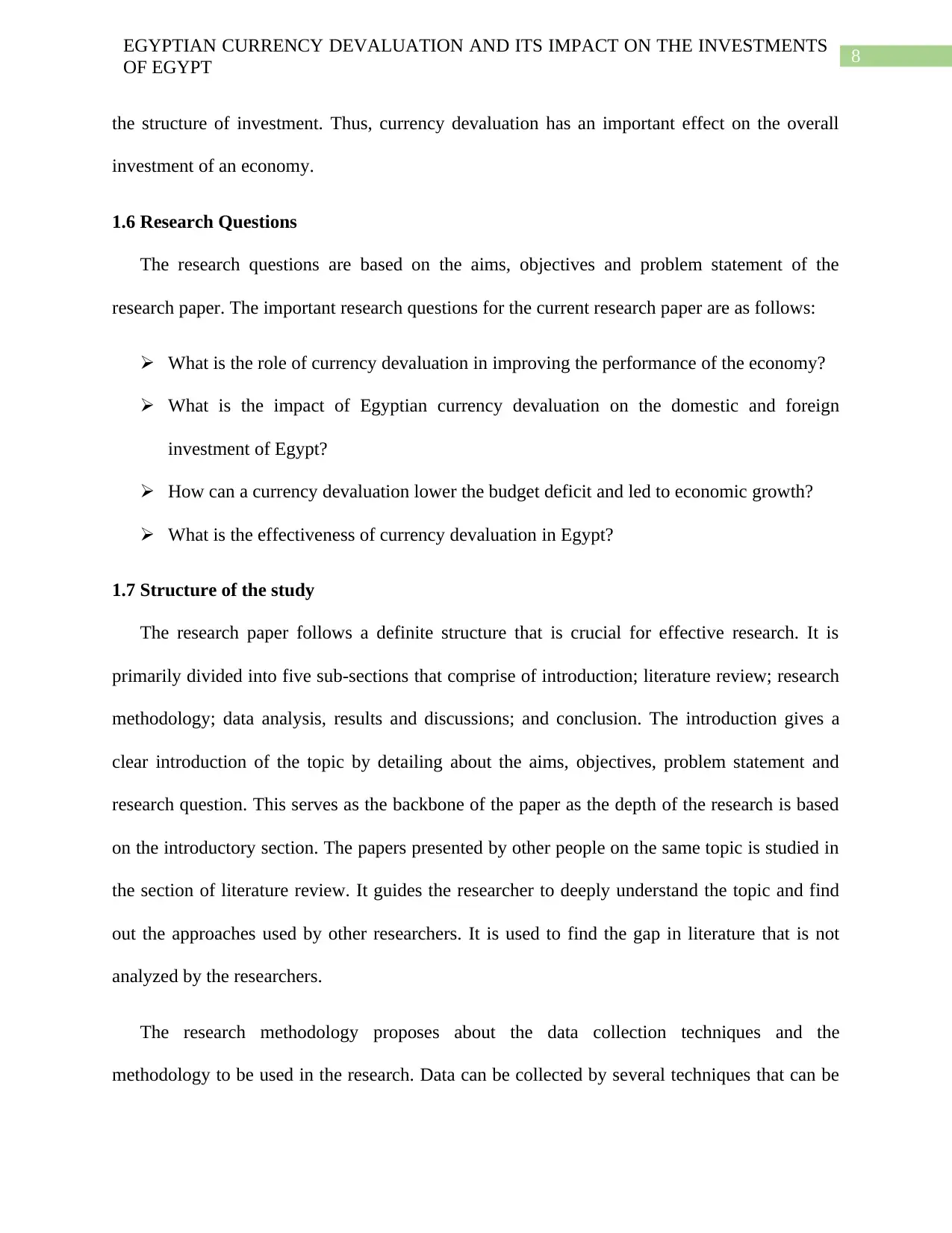
8
EGYPTIAN CURRENCY DEVALUATION AND ITS IMPACT ON THE INVESTMENTS
OF EGYPT
the structure of investment. Thus, currency devaluation has an important effect on the overall
investment of an economy.
1.6 Research Questions
The research questions are based on the aims, objectives and problem statement of the
research paper. The important research questions for the current research paper are as follows:
What is the role of currency devaluation in improving the performance of the economy?
What is the impact of Egyptian currency devaluation on the domestic and foreign
investment of Egypt?
How can a currency devaluation lower the budget deficit and led to economic growth?
What is the effectiveness of currency devaluation in Egypt?
1.7 Structure of the study
The research paper follows a definite structure that is crucial for effective research. It is
primarily divided into five sub-sections that comprise of introduction; literature review; research
methodology; data analysis, results and discussions; and conclusion. The introduction gives a
clear introduction of the topic by detailing about the aims, objectives, problem statement and
research question. This serves as the backbone of the paper as the depth of the research is based
on the introductory section. The papers presented by other people on the same topic is studied in
the section of literature review. It guides the researcher to deeply understand the topic and find
out the approaches used by other researchers. It is used to find the gap in literature that is not
analyzed by the researchers.
The research methodology proposes about the data collection techniques and the
methodology to be used in the research. Data can be collected by several techniques that can be
EGYPTIAN CURRENCY DEVALUATION AND ITS IMPACT ON THE INVESTMENTS
OF EGYPT
the structure of investment. Thus, currency devaluation has an important effect on the overall
investment of an economy.
1.6 Research Questions
The research questions are based on the aims, objectives and problem statement of the
research paper. The important research questions for the current research paper are as follows:
What is the role of currency devaluation in improving the performance of the economy?
What is the impact of Egyptian currency devaluation on the domestic and foreign
investment of Egypt?
How can a currency devaluation lower the budget deficit and led to economic growth?
What is the effectiveness of currency devaluation in Egypt?
1.7 Structure of the study
The research paper follows a definite structure that is crucial for effective research. It is
primarily divided into five sub-sections that comprise of introduction; literature review; research
methodology; data analysis, results and discussions; and conclusion. The introduction gives a
clear introduction of the topic by detailing about the aims, objectives, problem statement and
research question. This serves as the backbone of the paper as the depth of the research is based
on the introductory section. The papers presented by other people on the same topic is studied in
the section of literature review. It guides the researcher to deeply understand the topic and find
out the approaches used by other researchers. It is used to find the gap in literature that is not
analyzed by the researchers.
The research methodology proposes about the data collection techniques and the
methodology to be used in the research. Data can be collected by several techniques that can be
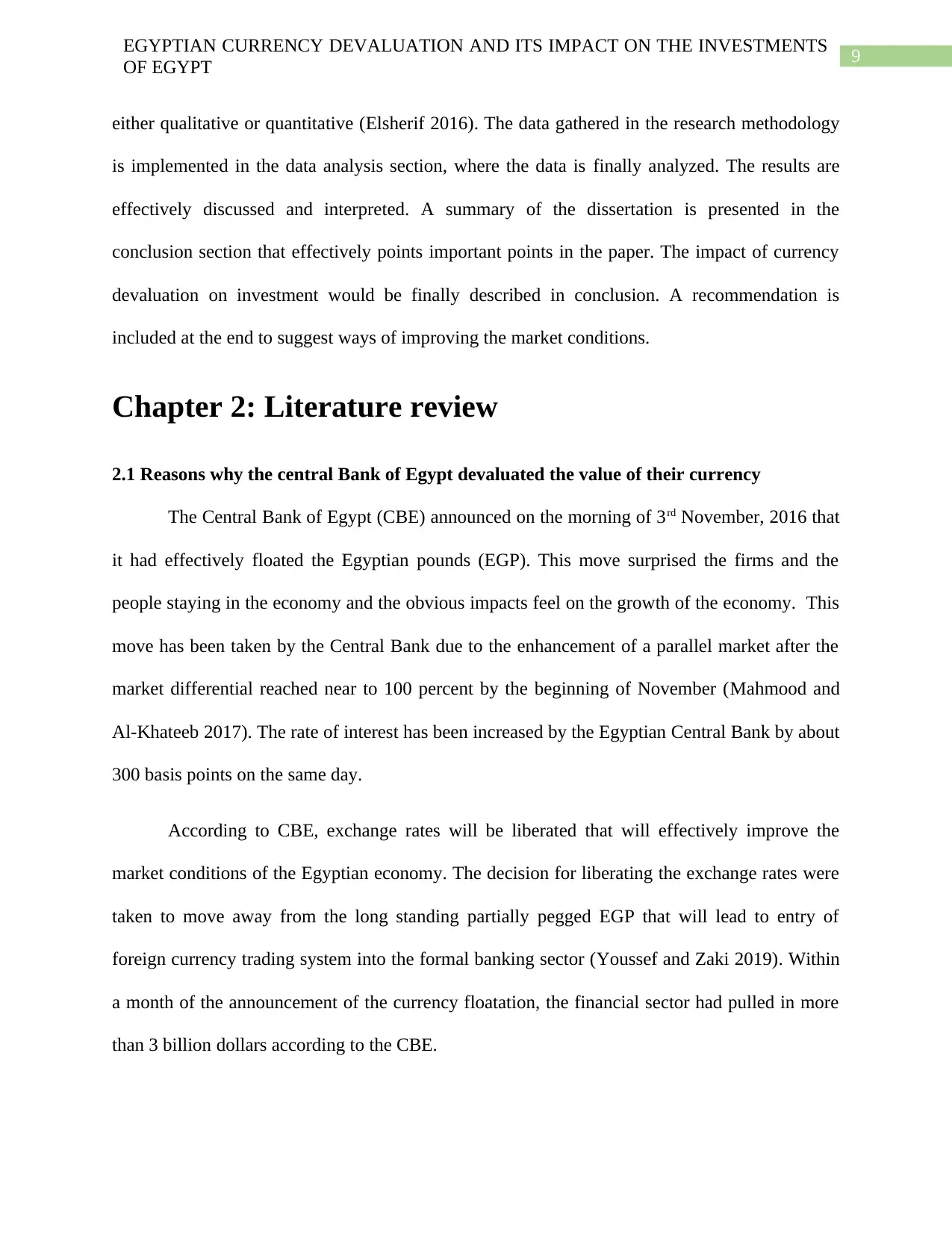
9
EGYPTIAN CURRENCY DEVALUATION AND ITS IMPACT ON THE INVESTMENTS
OF EGYPT
either qualitative or quantitative (Elsherif 2016). The data gathered in the research methodology
is implemented in the data analysis section, where the data is finally analyzed. The results are
effectively discussed and interpreted. A summary of the dissertation is presented in the
conclusion section that effectively points important points in the paper. The impact of currency
devaluation on investment would be finally described in conclusion. A recommendation is
included at the end to suggest ways of improving the market conditions.
Chapter 2: Literature review
2.1 Reasons why the central Bank of Egypt devaluated the value of their currency
The Central Bank of Egypt (CBE) announced on the morning of 3rd November, 2016 that
it had effectively floated the Egyptian pounds (EGP). This move surprised the firms and the
people staying in the economy and the obvious impacts feel on the growth of the economy. This
move has been taken by the Central Bank due to the enhancement of a parallel market after the
market differential reached near to 100 percent by the beginning of November (Mahmood and
Al-Khateeb 2017). The rate of interest has been increased by the Egyptian Central Bank by about
300 basis points on the same day.
According to CBE, exchange rates will be liberated that will effectively improve the
market conditions of the Egyptian economy. The decision for liberating the exchange rates were
taken to move away from the long standing partially pegged EGP that will lead to entry of
foreign currency trading system into the formal banking sector (Youssef and Zaki 2019). Within
a month of the announcement of the currency floatation, the financial sector had pulled in more
than 3 billion dollars according to the CBE.
EGYPTIAN CURRENCY DEVALUATION AND ITS IMPACT ON THE INVESTMENTS
OF EGYPT
either qualitative or quantitative (Elsherif 2016). The data gathered in the research methodology
is implemented in the data analysis section, where the data is finally analyzed. The results are
effectively discussed and interpreted. A summary of the dissertation is presented in the
conclusion section that effectively points important points in the paper. The impact of currency
devaluation on investment would be finally described in conclusion. A recommendation is
included at the end to suggest ways of improving the market conditions.
Chapter 2: Literature review
2.1 Reasons why the central Bank of Egypt devaluated the value of their currency
The Central Bank of Egypt (CBE) announced on the morning of 3rd November, 2016 that
it had effectively floated the Egyptian pounds (EGP). This move surprised the firms and the
people staying in the economy and the obvious impacts feel on the growth of the economy. This
move has been taken by the Central Bank due to the enhancement of a parallel market after the
market differential reached near to 100 percent by the beginning of November (Mahmood and
Al-Khateeb 2017). The rate of interest has been increased by the Egyptian Central Bank by about
300 basis points on the same day.
According to CBE, exchange rates will be liberated that will effectively improve the
market conditions of the Egyptian economy. The decision for liberating the exchange rates were
taken to move away from the long standing partially pegged EGP that will lead to entry of
foreign currency trading system into the formal banking sector (Youssef and Zaki 2019). Within
a month of the announcement of the currency floatation, the financial sector had pulled in more
than 3 billion dollars according to the CBE.
Secure Best Marks with AI Grader
Need help grading? Try our AI Grader for instant feedback on your assignments.
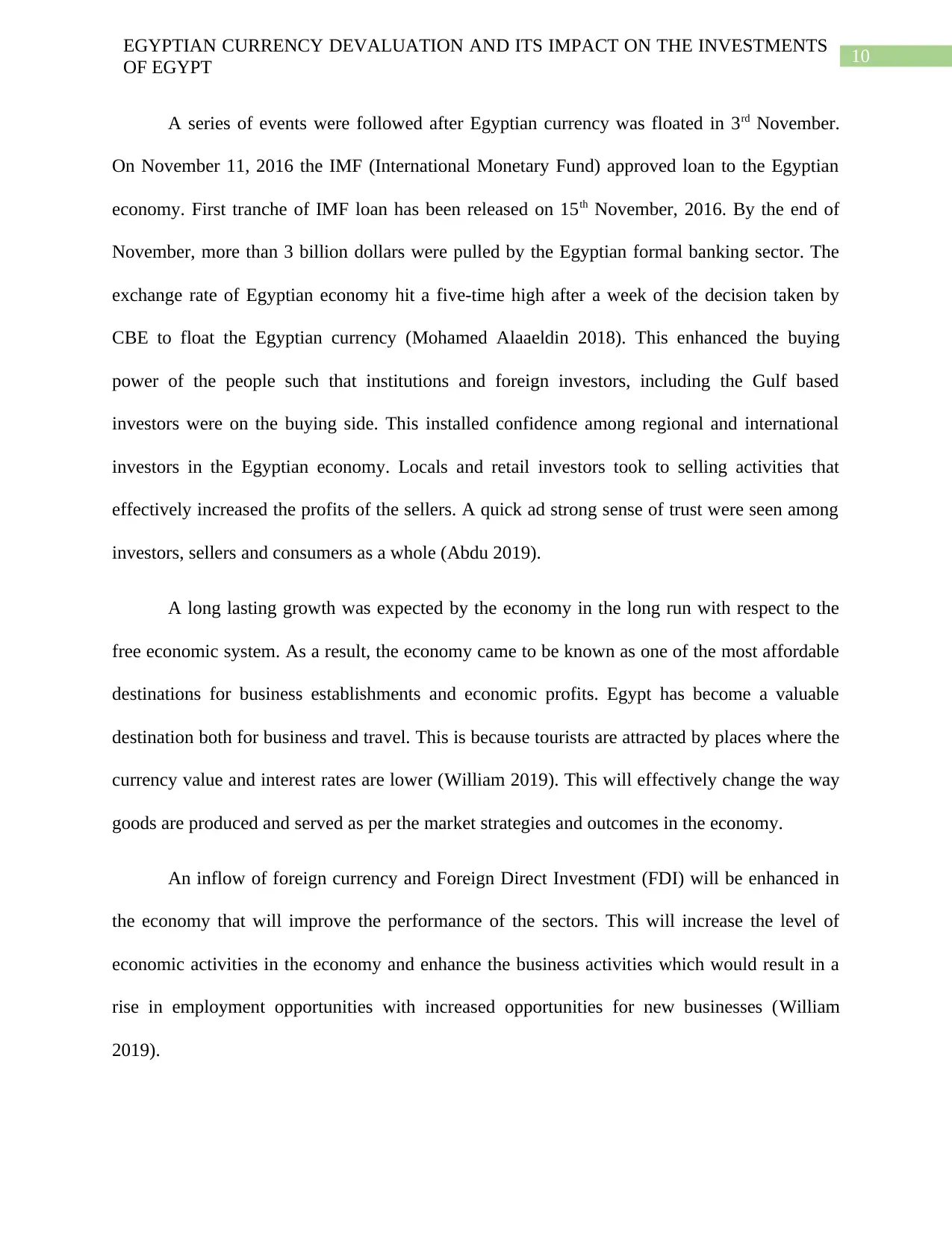
10
EGYPTIAN CURRENCY DEVALUATION AND ITS IMPACT ON THE INVESTMENTS
OF EGYPT
A series of events were followed after Egyptian currency was floated in 3rd November.
On November 11, 2016 the IMF (International Monetary Fund) approved loan to the Egyptian
economy. First tranche of IMF loan has been released on 15th November, 2016. By the end of
November, more than 3 billion dollars were pulled by the Egyptian formal banking sector. The
exchange rate of Egyptian economy hit a five-time high after a week of the decision taken by
CBE to float the Egyptian currency (Mohamed Alaaeldin 2018). This enhanced the buying
power of the people such that institutions and foreign investors, including the Gulf based
investors were on the buying side. This installed confidence among regional and international
investors in the Egyptian economy. Locals and retail investors took to selling activities that
effectively increased the profits of the sellers. A quick ad strong sense of trust were seen among
investors, sellers and consumers as a whole (Abdu 2019).
A long lasting growth was expected by the economy in the long run with respect to the
free economic system. As a result, the economy came to be known as one of the most affordable
destinations for business establishments and economic profits. Egypt has become a valuable
destination both for business and travel. This is because tourists are attracted by places where the
currency value and interest rates are lower (William 2019). This will effectively change the way
goods are produced and served as per the market strategies and outcomes in the economy.
An inflow of foreign currency and Foreign Direct Investment (FDI) will be enhanced in
the economy that will improve the performance of the sectors. This will increase the level of
economic activities in the economy and enhance the business activities which would result in a
rise in employment opportunities with increased opportunities for new businesses (William
2019).
EGYPTIAN CURRENCY DEVALUATION AND ITS IMPACT ON THE INVESTMENTS
OF EGYPT
A series of events were followed after Egyptian currency was floated in 3rd November.
On November 11, 2016 the IMF (International Monetary Fund) approved loan to the Egyptian
economy. First tranche of IMF loan has been released on 15th November, 2016. By the end of
November, more than 3 billion dollars were pulled by the Egyptian formal banking sector. The
exchange rate of Egyptian economy hit a five-time high after a week of the decision taken by
CBE to float the Egyptian currency (Mohamed Alaaeldin 2018). This enhanced the buying
power of the people such that institutions and foreign investors, including the Gulf based
investors were on the buying side. This installed confidence among regional and international
investors in the Egyptian economy. Locals and retail investors took to selling activities that
effectively increased the profits of the sellers. A quick ad strong sense of trust were seen among
investors, sellers and consumers as a whole (Abdu 2019).
A long lasting growth was expected by the economy in the long run with respect to the
free economic system. As a result, the economy came to be known as one of the most affordable
destinations for business establishments and economic profits. Egypt has become a valuable
destination both for business and travel. This is because tourists are attracted by places where the
currency value and interest rates are lower (William 2019). This will effectively change the way
goods are produced and served as per the market strategies and outcomes in the economy.
An inflow of foreign currency and Foreign Direct Investment (FDI) will be enhanced in
the economy that will improve the performance of the sectors. This will increase the level of
economic activities in the economy and enhance the business activities which would result in a
rise in employment opportunities with increased opportunities for new businesses (William
2019).
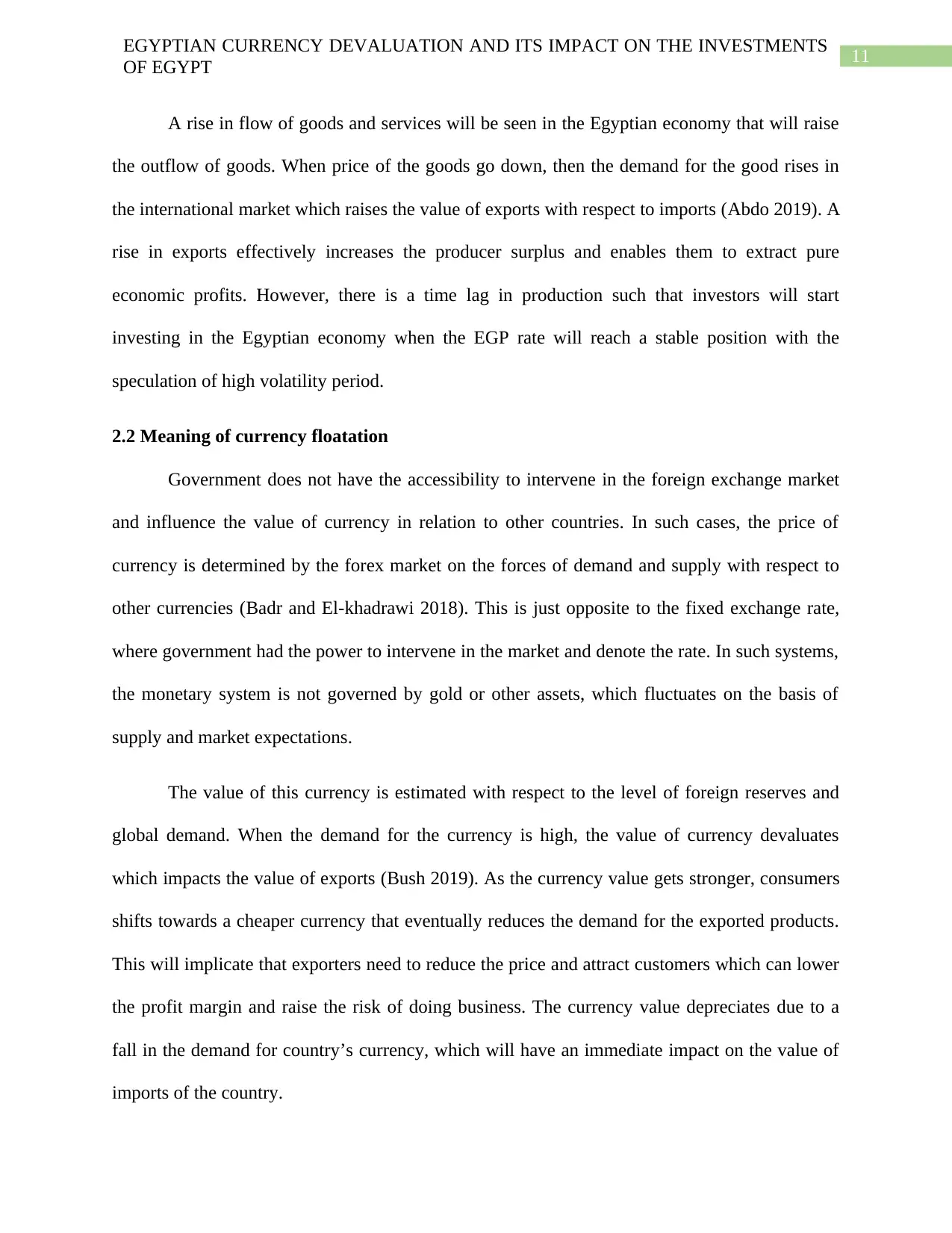
11
EGYPTIAN CURRENCY DEVALUATION AND ITS IMPACT ON THE INVESTMENTS
OF EGYPT
A rise in flow of goods and services will be seen in the Egyptian economy that will raise
the outflow of goods. When price of the goods go down, then the demand for the good rises in
the international market which raises the value of exports with respect to imports (Abdo 2019). A
rise in exports effectively increases the producer surplus and enables them to extract pure
economic profits. However, there is a time lag in production such that investors will start
investing in the Egyptian economy when the EGP rate will reach a stable position with the
speculation of high volatility period.
2.2 Meaning of currency floatation
Government does not have the accessibility to intervene in the foreign exchange market
and influence the value of currency in relation to other countries. In such cases, the price of
currency is determined by the forex market on the forces of demand and supply with respect to
other currencies (Badr and El-khadrawi 2018). This is just opposite to the fixed exchange rate,
where government had the power to intervene in the market and denote the rate. In such systems,
the monetary system is not governed by gold or other assets, which fluctuates on the basis of
supply and market expectations.
The value of this currency is estimated with respect to the level of foreign reserves and
global demand. When the demand for the currency is high, the value of currency devaluates
which impacts the value of exports (Bush 2019). As the currency value gets stronger, consumers
shifts towards a cheaper currency that eventually reduces the demand for the exported products.
This will implicate that exporters need to reduce the price and attract customers which can lower
the profit margin and raise the risk of doing business. The currency value depreciates due to a
fall in the demand for country’s currency, which will have an immediate impact on the value of
imports of the country.
EGYPTIAN CURRENCY DEVALUATION AND ITS IMPACT ON THE INVESTMENTS
OF EGYPT
A rise in flow of goods and services will be seen in the Egyptian economy that will raise
the outflow of goods. When price of the goods go down, then the demand for the good rises in
the international market which raises the value of exports with respect to imports (Abdo 2019). A
rise in exports effectively increases the producer surplus and enables them to extract pure
economic profits. However, there is a time lag in production such that investors will start
investing in the Egyptian economy when the EGP rate will reach a stable position with the
speculation of high volatility period.
2.2 Meaning of currency floatation
Government does not have the accessibility to intervene in the foreign exchange market
and influence the value of currency in relation to other countries. In such cases, the price of
currency is determined by the forex market on the forces of demand and supply with respect to
other currencies (Badr and El-khadrawi 2018). This is just opposite to the fixed exchange rate,
where government had the power to intervene in the market and denote the rate. In such systems,
the monetary system is not governed by gold or other assets, which fluctuates on the basis of
supply and market expectations.
The value of this currency is estimated with respect to the level of foreign reserves and
global demand. When the demand for the currency is high, the value of currency devaluates
which impacts the value of exports (Bush 2019). As the currency value gets stronger, consumers
shifts towards a cheaper currency that eventually reduces the demand for the exported products.
This will implicate that exporters need to reduce the price and attract customers which can lower
the profit margin and raise the risk of doing business. The currency value depreciates due to a
fall in the demand for country’s currency, which will have an immediate impact on the value of
imports of the country.
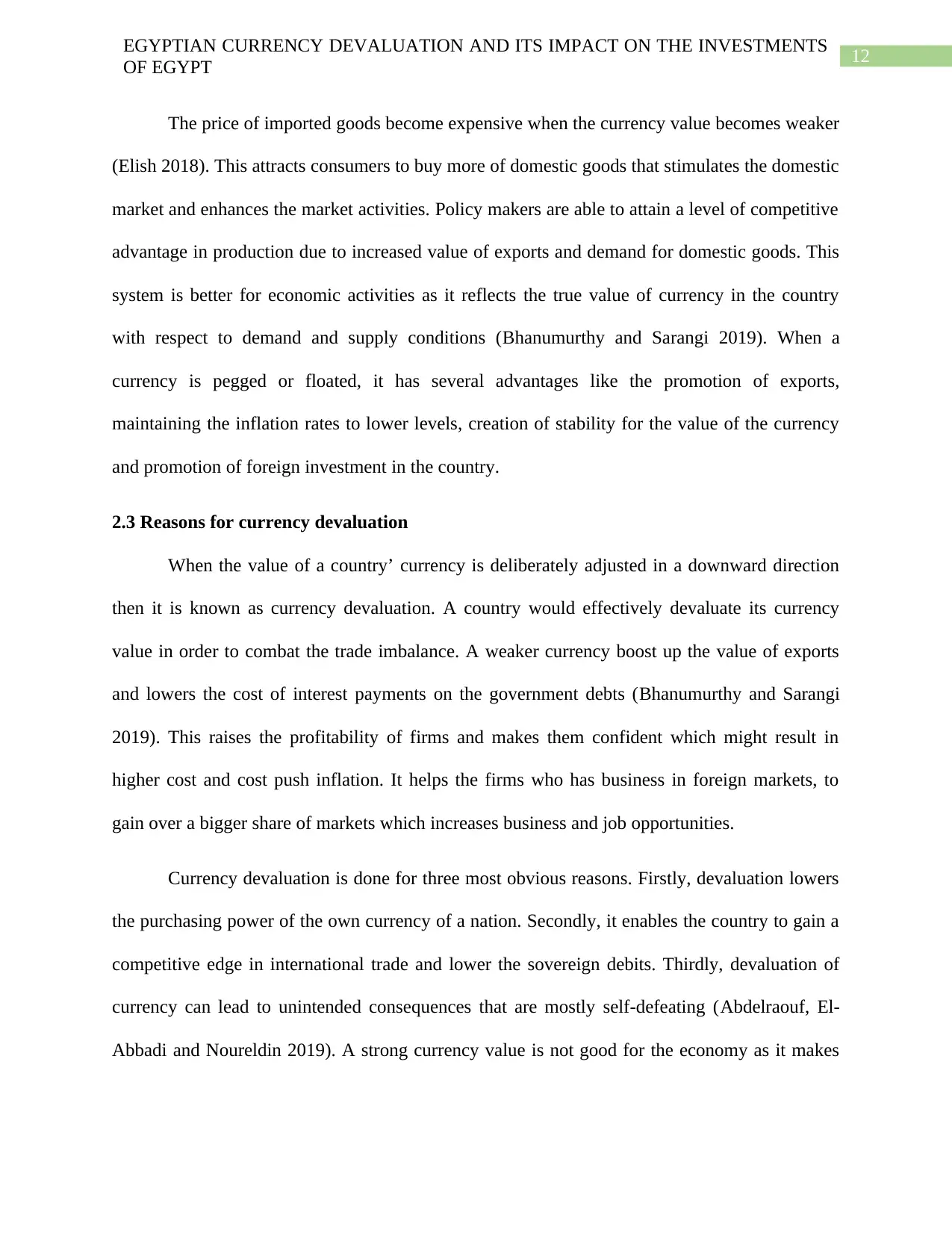
12
EGYPTIAN CURRENCY DEVALUATION AND ITS IMPACT ON THE INVESTMENTS
OF EGYPT
The price of imported goods become expensive when the currency value becomes weaker
(Elish 2018). This attracts consumers to buy more of domestic goods that stimulates the domestic
market and enhances the market activities. Policy makers are able to attain a level of competitive
advantage in production due to increased value of exports and demand for domestic goods. This
system is better for economic activities as it reflects the true value of currency in the country
with respect to demand and supply conditions (Bhanumurthy and Sarangi 2019). When a
currency is pegged or floated, it has several advantages like the promotion of exports,
maintaining the inflation rates to lower levels, creation of stability for the value of the currency
and promotion of foreign investment in the country.
2.3 Reasons for currency devaluation
When the value of a country’ currency is deliberately adjusted in a downward direction
then it is known as currency devaluation. A country would effectively devaluate its currency
value in order to combat the trade imbalance. A weaker currency boost up the value of exports
and lowers the cost of interest payments on the government debts (Bhanumurthy and Sarangi
2019). This raises the profitability of firms and makes them confident which might result in
higher cost and cost push inflation. It helps the firms who has business in foreign markets, to
gain over a bigger share of markets which increases business and job opportunities.
Currency devaluation is done for three most obvious reasons. Firstly, devaluation lowers
the purchasing power of the own currency of a nation. Secondly, it enables the country to gain a
competitive edge in international trade and lower the sovereign debits. Thirdly, devaluation of
currency can lead to unintended consequences that are mostly self-defeating (Abdelraouf, El-
Abbadi and Noureldin 2019). A strong currency value is not good for the economy as it makes
EGYPTIAN CURRENCY DEVALUATION AND ITS IMPACT ON THE INVESTMENTS
OF EGYPT
The price of imported goods become expensive when the currency value becomes weaker
(Elish 2018). This attracts consumers to buy more of domestic goods that stimulates the domestic
market and enhances the market activities. Policy makers are able to attain a level of competitive
advantage in production due to increased value of exports and demand for domestic goods. This
system is better for economic activities as it reflects the true value of currency in the country
with respect to demand and supply conditions (Bhanumurthy and Sarangi 2019). When a
currency is pegged or floated, it has several advantages like the promotion of exports,
maintaining the inflation rates to lower levels, creation of stability for the value of the currency
and promotion of foreign investment in the country.
2.3 Reasons for currency devaluation
When the value of a country’ currency is deliberately adjusted in a downward direction
then it is known as currency devaluation. A country would effectively devaluate its currency
value in order to combat the trade imbalance. A weaker currency boost up the value of exports
and lowers the cost of interest payments on the government debts (Bhanumurthy and Sarangi
2019). This raises the profitability of firms and makes them confident which might result in
higher cost and cost push inflation. It helps the firms who has business in foreign markets, to
gain over a bigger share of markets which increases business and job opportunities.
Currency devaluation is done for three most obvious reasons. Firstly, devaluation lowers
the purchasing power of the own currency of a nation. Secondly, it enables the country to gain a
competitive edge in international trade and lower the sovereign debits. Thirdly, devaluation of
currency can lead to unintended consequences that are mostly self-defeating (Abdelraouf, El-
Abbadi and Noureldin 2019). A strong currency value is not good for the economy as it makes
Paraphrase This Document
Need a fresh take? Get an instant paraphrase of this document with our AI Paraphraser
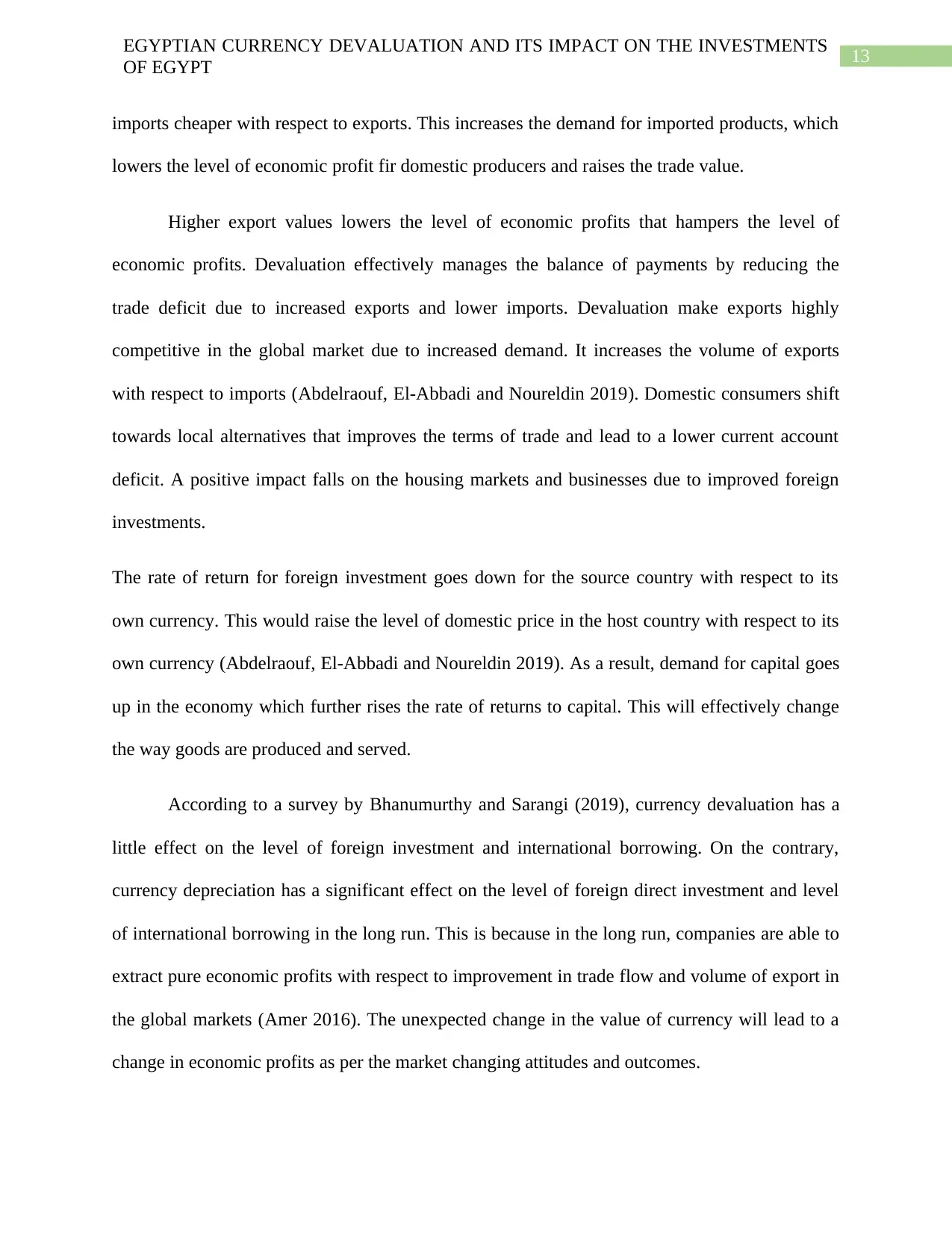
13
EGYPTIAN CURRENCY DEVALUATION AND ITS IMPACT ON THE INVESTMENTS
OF EGYPT
imports cheaper with respect to exports. This increases the demand for imported products, which
lowers the level of economic profit fir domestic producers and raises the trade value.
Higher export values lowers the level of economic profits that hampers the level of
economic profits. Devaluation effectively manages the balance of payments by reducing the
trade deficit due to increased exports and lower imports. Devaluation make exports highly
competitive in the global market due to increased demand. It increases the volume of exports
with respect to imports (Abdelraouf, El-Abbadi and Noureldin 2019). Domestic consumers shift
towards local alternatives that improves the terms of trade and lead to a lower current account
deficit. A positive impact falls on the housing markets and businesses due to improved foreign
investments.
The rate of return for foreign investment goes down for the source country with respect to its
own currency. This would raise the level of domestic price in the host country with respect to its
own currency (Abdelraouf, El-Abbadi and Noureldin 2019). As a result, demand for capital goes
up in the economy which further rises the rate of returns to capital. This will effectively change
the way goods are produced and served.
According to a survey by Bhanumurthy and Sarangi (2019), currency devaluation has a
little effect on the level of foreign investment and international borrowing. On the contrary,
currency depreciation has a significant effect on the level of foreign direct investment and level
of international borrowing in the long run. This is because in the long run, companies are able to
extract pure economic profits with respect to improvement in trade flow and volume of export in
the global markets (Amer 2016). The unexpected change in the value of currency will lead to a
change in economic profits as per the market changing attitudes and outcomes.
EGYPTIAN CURRENCY DEVALUATION AND ITS IMPACT ON THE INVESTMENTS
OF EGYPT
imports cheaper with respect to exports. This increases the demand for imported products, which
lowers the level of economic profit fir domestic producers and raises the trade value.
Higher export values lowers the level of economic profits that hampers the level of
economic profits. Devaluation effectively manages the balance of payments by reducing the
trade deficit due to increased exports and lower imports. Devaluation make exports highly
competitive in the global market due to increased demand. It increases the volume of exports
with respect to imports (Abdelraouf, El-Abbadi and Noureldin 2019). Domestic consumers shift
towards local alternatives that improves the terms of trade and lead to a lower current account
deficit. A positive impact falls on the housing markets and businesses due to improved foreign
investments.
The rate of return for foreign investment goes down for the source country with respect to its
own currency. This would raise the level of domestic price in the host country with respect to its
own currency (Abdelraouf, El-Abbadi and Noureldin 2019). As a result, demand for capital goes
up in the economy which further rises the rate of returns to capital. This will effectively change
the way goods are produced and served.
According to a survey by Bhanumurthy and Sarangi (2019), currency devaluation has a
little effect on the level of foreign investment and international borrowing. On the contrary,
currency depreciation has a significant effect on the level of foreign direct investment and level
of international borrowing in the long run. This is because in the long run, companies are able to
extract pure economic profits with respect to improvement in trade flow and volume of export in
the global markets (Amer 2016). The unexpected change in the value of currency will lead to a
change in economic profits as per the market changing attitudes and outcomes.
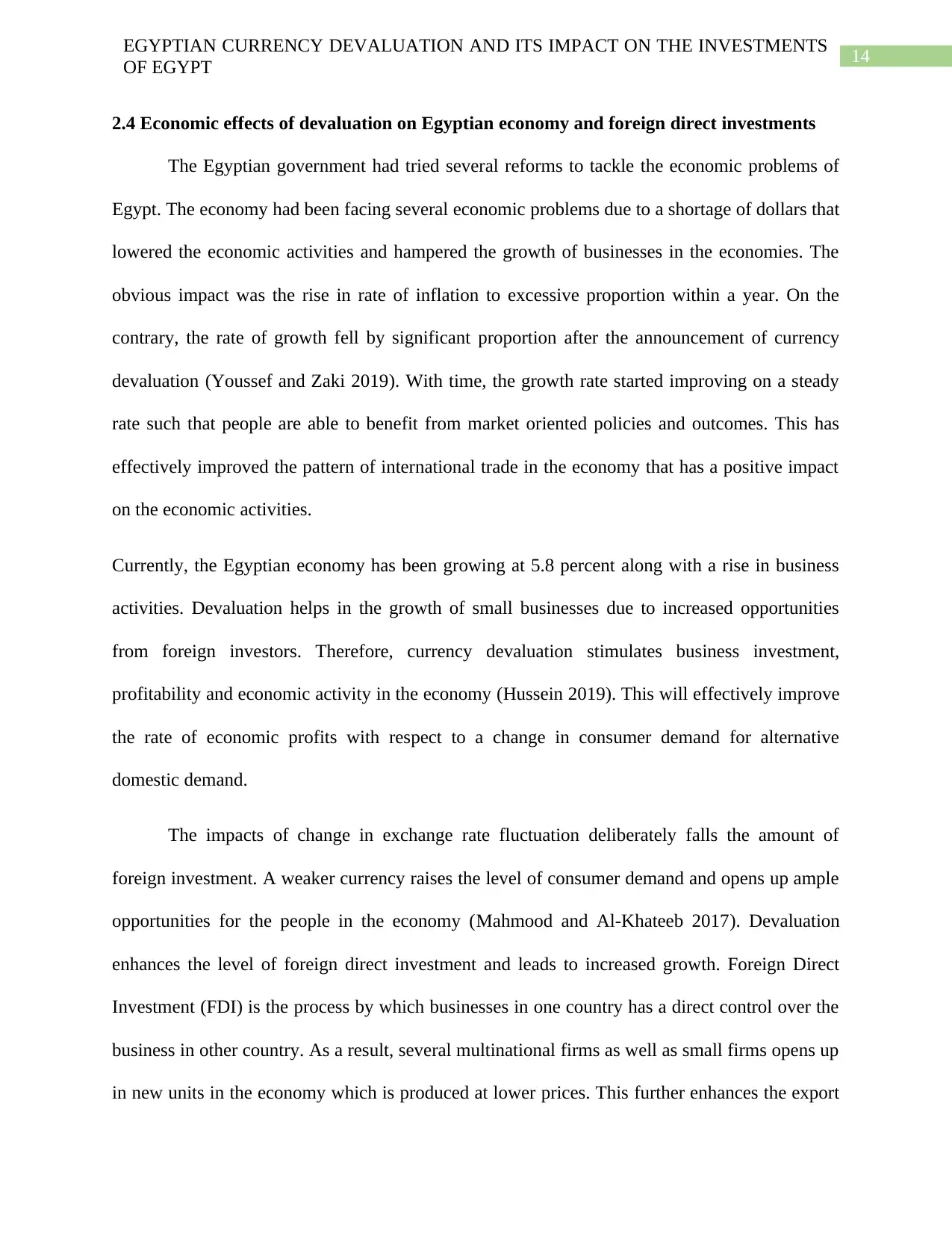
14
EGYPTIAN CURRENCY DEVALUATION AND ITS IMPACT ON THE INVESTMENTS
OF EGYPT
2.4 Economic effects of devaluation on Egyptian economy and foreign direct investments
The Egyptian government had tried several reforms to tackle the economic problems of
Egypt. The economy had been facing several economic problems due to a shortage of dollars that
lowered the economic activities and hampered the growth of businesses in the economies. The
obvious impact was the rise in rate of inflation to excessive proportion within a year. On the
contrary, the rate of growth fell by significant proportion after the announcement of currency
devaluation (Youssef and Zaki 2019). With time, the growth rate started improving on a steady
rate such that people are able to benefit from market oriented policies and outcomes. This has
effectively improved the pattern of international trade in the economy that has a positive impact
on the economic activities.
Currently, the Egyptian economy has been growing at 5.8 percent along with a rise in business
activities. Devaluation helps in the growth of small businesses due to increased opportunities
from foreign investors. Therefore, currency devaluation stimulates business investment,
profitability and economic activity in the economy (Hussein 2019). This will effectively improve
the rate of economic profits with respect to a change in consumer demand for alternative
domestic demand.
The impacts of change in exchange rate fluctuation deliberately falls the amount of
foreign investment. A weaker currency raises the level of consumer demand and opens up ample
opportunities for the people in the economy (Mahmood and Al-Khateeb 2017). Devaluation
enhances the level of foreign direct investment and leads to increased growth. Foreign Direct
Investment (FDI) is the process by which businesses in one country has a direct control over the
business in other country. As a result, several multinational firms as well as small firms opens up
in new units in the economy which is produced at lower prices. This further enhances the export
EGYPTIAN CURRENCY DEVALUATION AND ITS IMPACT ON THE INVESTMENTS
OF EGYPT
2.4 Economic effects of devaluation on Egyptian economy and foreign direct investments
The Egyptian government had tried several reforms to tackle the economic problems of
Egypt. The economy had been facing several economic problems due to a shortage of dollars that
lowered the economic activities and hampered the growth of businesses in the economies. The
obvious impact was the rise in rate of inflation to excessive proportion within a year. On the
contrary, the rate of growth fell by significant proportion after the announcement of currency
devaluation (Youssef and Zaki 2019). With time, the growth rate started improving on a steady
rate such that people are able to benefit from market oriented policies and outcomes. This has
effectively improved the pattern of international trade in the economy that has a positive impact
on the economic activities.
Currently, the Egyptian economy has been growing at 5.8 percent along with a rise in business
activities. Devaluation helps in the growth of small businesses due to increased opportunities
from foreign investors. Therefore, currency devaluation stimulates business investment,
profitability and economic activity in the economy (Hussein 2019). This will effectively improve
the rate of economic profits with respect to a change in consumer demand for alternative
domestic demand.
The impacts of change in exchange rate fluctuation deliberately falls the amount of
foreign investment. A weaker currency raises the level of consumer demand and opens up ample
opportunities for the people in the economy (Mahmood and Al-Khateeb 2017). Devaluation
enhances the level of foreign direct investment and leads to increased growth. Foreign Direct
Investment (FDI) is the process by which businesses in one country has a direct control over the
business in other country. As a result, several multinational firms as well as small firms opens up
in new units in the economy which is produced at lower prices. This further enhances the export
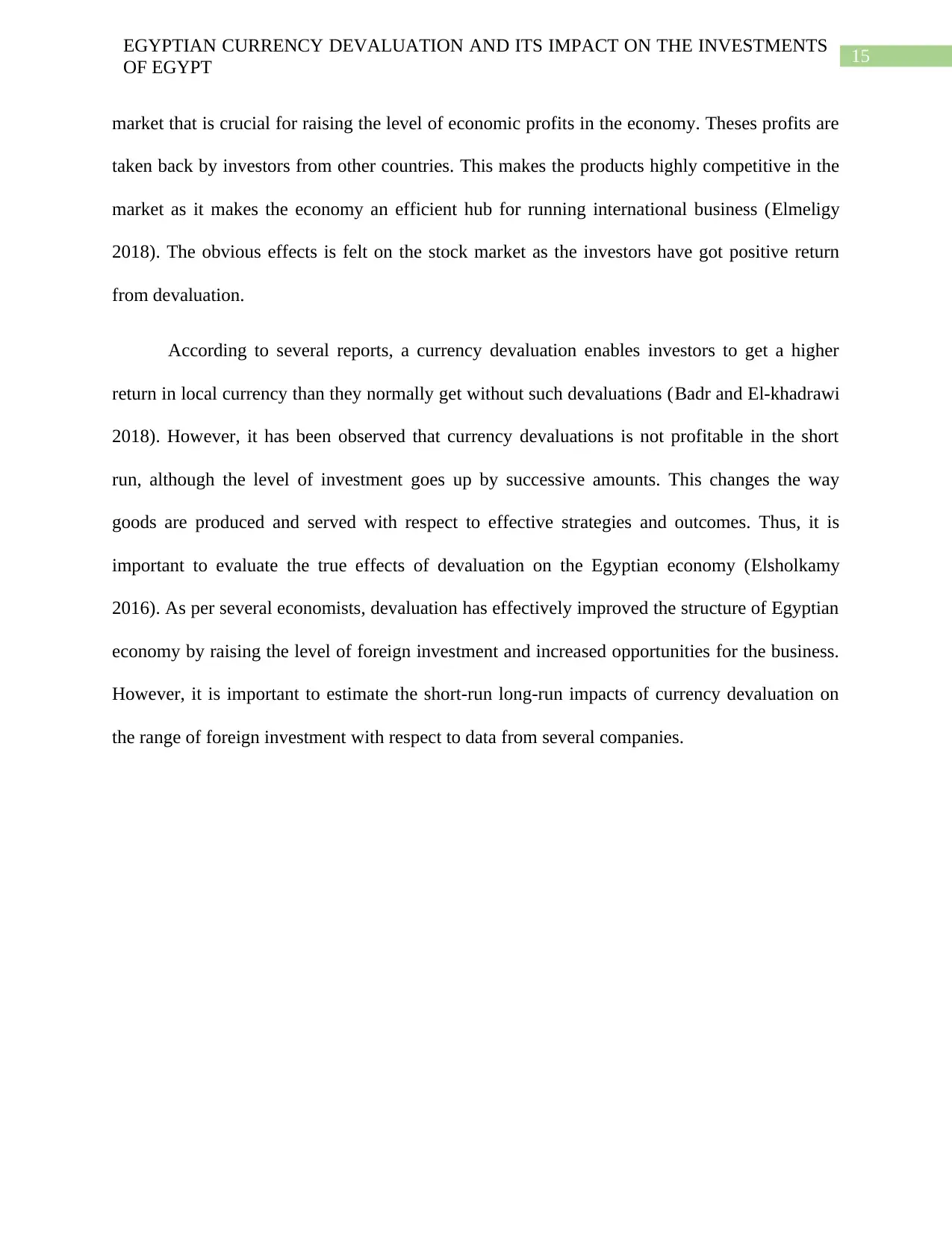
15
EGYPTIAN CURRENCY DEVALUATION AND ITS IMPACT ON THE INVESTMENTS
OF EGYPT
market that is crucial for raising the level of economic profits in the economy. Theses profits are
taken back by investors from other countries. This makes the products highly competitive in the
market as it makes the economy an efficient hub for running international business (Elmeligy
2018). The obvious effects is felt on the stock market as the investors have got positive return
from devaluation.
According to several reports, a currency devaluation enables investors to get a higher
return in local currency than they normally get without such devaluations (Badr and El-khadrawi
2018). However, it has been observed that currency devaluations is not profitable in the short
run, although the level of investment goes up by successive amounts. This changes the way
goods are produced and served with respect to effective strategies and outcomes. Thus, it is
important to evaluate the true effects of devaluation on the Egyptian economy (Elsholkamy
2016). As per several economists, devaluation has effectively improved the structure of Egyptian
economy by raising the level of foreign investment and increased opportunities for the business.
However, it is important to estimate the short-run long-run impacts of currency devaluation on
the range of foreign investment with respect to data from several companies.
EGYPTIAN CURRENCY DEVALUATION AND ITS IMPACT ON THE INVESTMENTS
OF EGYPT
market that is crucial for raising the level of economic profits in the economy. Theses profits are
taken back by investors from other countries. This makes the products highly competitive in the
market as it makes the economy an efficient hub for running international business (Elmeligy
2018). The obvious effects is felt on the stock market as the investors have got positive return
from devaluation.
According to several reports, a currency devaluation enables investors to get a higher
return in local currency than they normally get without such devaluations (Badr and El-khadrawi
2018). However, it has been observed that currency devaluations is not profitable in the short
run, although the level of investment goes up by successive amounts. This changes the way
goods are produced and served with respect to effective strategies and outcomes. Thus, it is
important to evaluate the true effects of devaluation on the Egyptian economy (Elsholkamy
2016). As per several economists, devaluation has effectively improved the structure of Egyptian
economy by raising the level of foreign investment and increased opportunities for the business.
However, it is important to estimate the short-run long-run impacts of currency devaluation on
the range of foreign investment with respect to data from several companies.
Secure Best Marks with AI Grader
Need help grading? Try our AI Grader for instant feedback on your assignments.
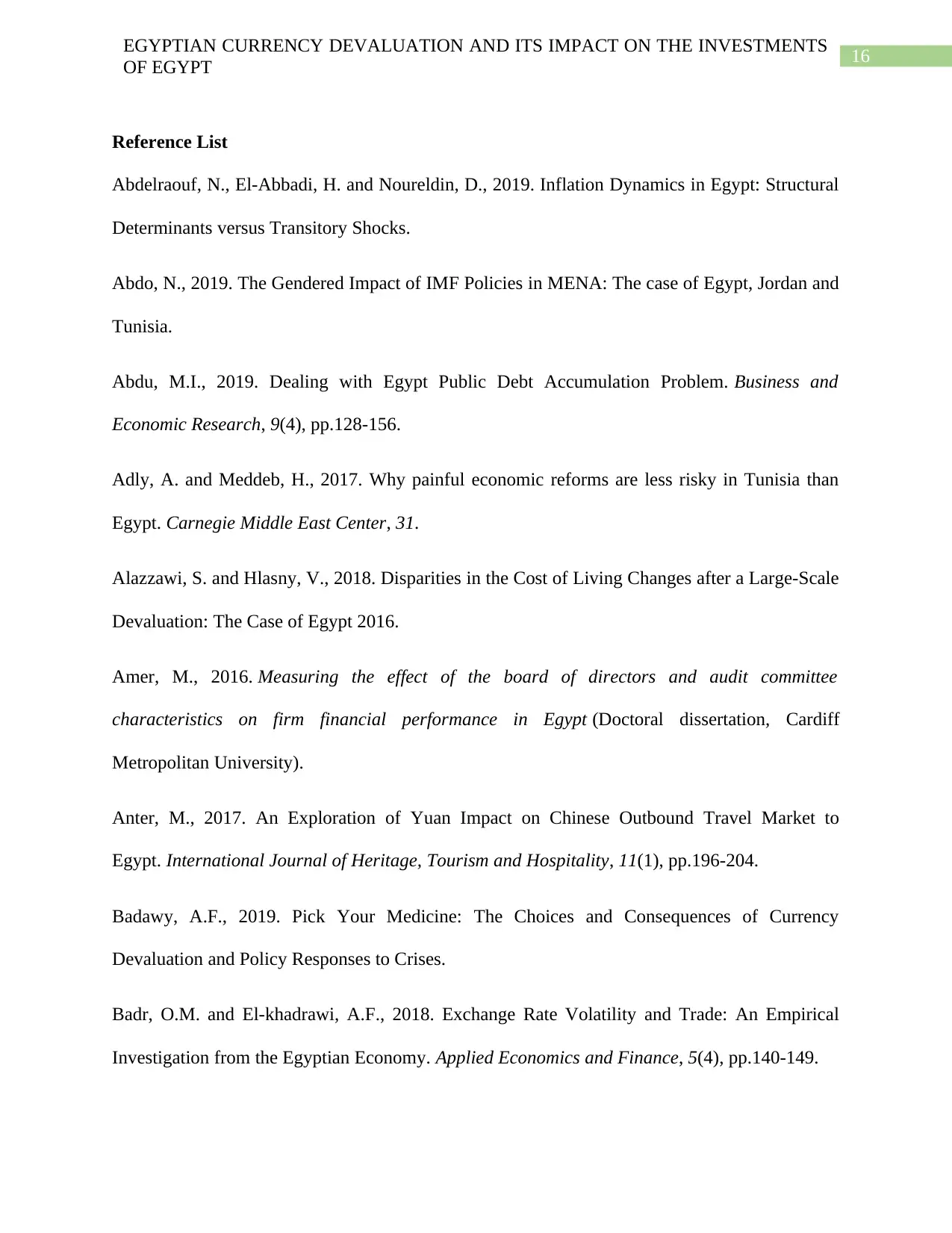
16
EGYPTIAN CURRENCY DEVALUATION AND ITS IMPACT ON THE INVESTMENTS
OF EGYPT
Reference List
Abdelraouf, N., El-Abbadi, H. and Noureldin, D., 2019. Inflation Dynamics in Egypt: Structural
Determinants versus Transitory Shocks.
Abdo, N., 2019. The Gendered Impact of IMF Policies in MENA: The case of Egypt, Jordan and
Tunisia.
Abdu, M.I., 2019. Dealing with Egypt Public Debt Accumulation Problem. Business and
Economic Research, 9(4), pp.128-156.
Adly, A. and Meddeb, H., 2017. Why painful economic reforms are less risky in Tunisia than
Egypt. Carnegie Middle East Center, 31.
Alazzawi, S. and Hlasny, V., 2018. Disparities in the Cost of Living Changes after a Large-Scale
Devaluation: The Case of Egypt 2016.
Amer, M., 2016. Measuring the effect of the board of directors and audit committee
characteristics on firm financial performance in Egypt (Doctoral dissertation, Cardiff
Metropolitan University).
Anter, M., 2017. An Exploration of Yuan Impact on Chinese Outbound Travel Market to
Egypt. International Journal of Heritage, Tourism and Hospitality, 11(1), pp.196-204.
Badawy, A.F., 2019. Pick Your Medicine: The Choices and Consequences of Currency
Devaluation and Policy Responses to Crises.
Badr, O.M. and El-khadrawi, A.F., 2018. Exchange Rate Volatility and Trade: An Empirical
Investigation from the Egyptian Economy. Applied Economics and Finance, 5(4), pp.140-149.
EGYPTIAN CURRENCY DEVALUATION AND ITS IMPACT ON THE INVESTMENTS
OF EGYPT
Reference List
Abdelraouf, N., El-Abbadi, H. and Noureldin, D., 2019. Inflation Dynamics in Egypt: Structural
Determinants versus Transitory Shocks.
Abdo, N., 2019. The Gendered Impact of IMF Policies in MENA: The case of Egypt, Jordan and
Tunisia.
Abdu, M.I., 2019. Dealing with Egypt Public Debt Accumulation Problem. Business and
Economic Research, 9(4), pp.128-156.
Adly, A. and Meddeb, H., 2017. Why painful economic reforms are less risky in Tunisia than
Egypt. Carnegie Middle East Center, 31.
Alazzawi, S. and Hlasny, V., 2018. Disparities in the Cost of Living Changes after a Large-Scale
Devaluation: The Case of Egypt 2016.
Amer, M., 2016. Measuring the effect of the board of directors and audit committee
characteristics on firm financial performance in Egypt (Doctoral dissertation, Cardiff
Metropolitan University).
Anter, M., 2017. An Exploration of Yuan Impact on Chinese Outbound Travel Market to
Egypt. International Journal of Heritage, Tourism and Hospitality, 11(1), pp.196-204.
Badawy, A.F., 2019. Pick Your Medicine: The Choices and Consequences of Currency
Devaluation and Policy Responses to Crises.
Badr, O.M. and El-khadrawi, A.F., 2018. Exchange Rate Volatility and Trade: An Empirical
Investigation from the Egyptian Economy. Applied Economics and Finance, 5(4), pp.140-149.
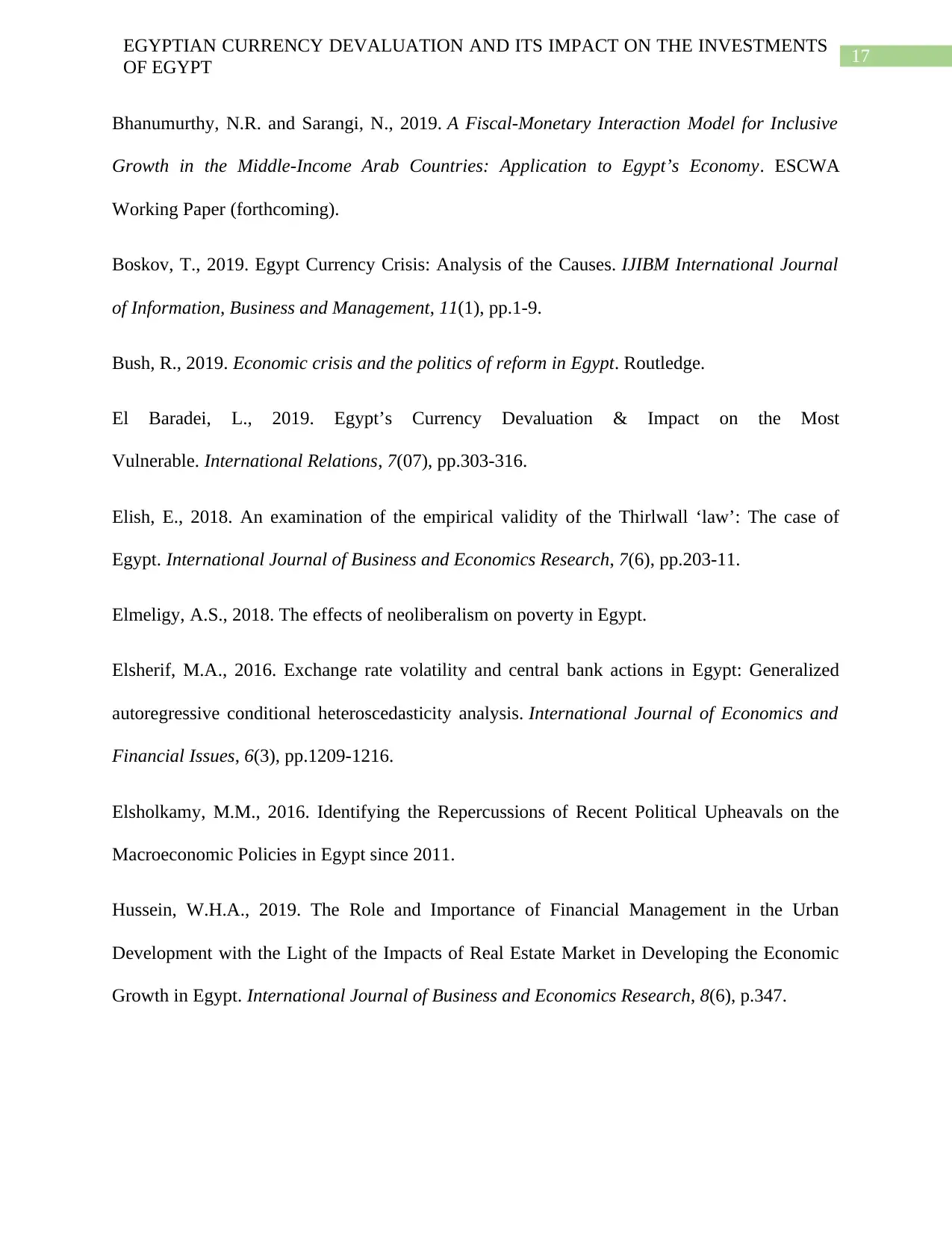
17
EGYPTIAN CURRENCY DEVALUATION AND ITS IMPACT ON THE INVESTMENTS
OF EGYPT
Bhanumurthy, N.R. and Sarangi, N., 2019. A Fiscal-Monetary Interaction Model for Inclusive
Growth in the Middle-Income Arab Countries: Application to Egypt’s Economy. ESCWA
Working Paper (forthcoming).
Boskov, T., 2019. Egypt Currency Crisis: Analysis of the Causes. IJIBM International Journal
of Information, Business and Management, 11(1), pp.1-9.
Bush, R., 2019. Economic crisis and the politics of reform in Egypt. Routledge.
El Baradei, L., 2019. Egypt’s Currency Devaluation & Impact on the Most
Vulnerable. International Relations, 7(07), pp.303-316.
Elish, E., 2018. An examination of the empirical validity of the Thirlwall ‘law’: The case of
Egypt. International Journal of Business and Economics Research, 7(6), pp.203-11.
Elmeligy, A.S., 2018. The effects of neoliberalism on poverty in Egypt.
Elsherif, M.A., 2016. Exchange rate volatility and central bank actions in Egypt: Generalized
autoregressive conditional heteroscedasticity analysis. International Journal of Economics and
Financial Issues, 6(3), pp.1209-1216.
Elsholkamy, M.M., 2016. Identifying the Repercussions of Recent Political Upheavals on the
Macroeconomic Policies in Egypt since 2011.
Hussein, W.H.A., 2019. The Role and Importance of Financial Management in the Urban
Development with the Light of the Impacts of Real Estate Market in Developing the Economic
Growth in Egypt. International Journal of Business and Economics Research, 8(6), p.347.
EGYPTIAN CURRENCY DEVALUATION AND ITS IMPACT ON THE INVESTMENTS
OF EGYPT
Bhanumurthy, N.R. and Sarangi, N., 2019. A Fiscal-Monetary Interaction Model for Inclusive
Growth in the Middle-Income Arab Countries: Application to Egypt’s Economy. ESCWA
Working Paper (forthcoming).
Boskov, T., 2019. Egypt Currency Crisis: Analysis of the Causes. IJIBM International Journal
of Information, Business and Management, 11(1), pp.1-9.
Bush, R., 2019. Economic crisis and the politics of reform in Egypt. Routledge.
El Baradei, L., 2019. Egypt’s Currency Devaluation & Impact on the Most
Vulnerable. International Relations, 7(07), pp.303-316.
Elish, E., 2018. An examination of the empirical validity of the Thirlwall ‘law’: The case of
Egypt. International Journal of Business and Economics Research, 7(6), pp.203-11.
Elmeligy, A.S., 2018. The effects of neoliberalism on poverty in Egypt.
Elsherif, M.A., 2016. Exchange rate volatility and central bank actions in Egypt: Generalized
autoregressive conditional heteroscedasticity analysis. International Journal of Economics and
Financial Issues, 6(3), pp.1209-1216.
Elsholkamy, M.M., 2016. Identifying the Repercussions of Recent Political Upheavals on the
Macroeconomic Policies in Egypt since 2011.
Hussein, W.H.A., 2019. The Role and Importance of Financial Management in the Urban
Development with the Light of the Impacts of Real Estate Market in Developing the Economic
Growth in Egypt. International Journal of Business and Economics Research, 8(6), p.347.
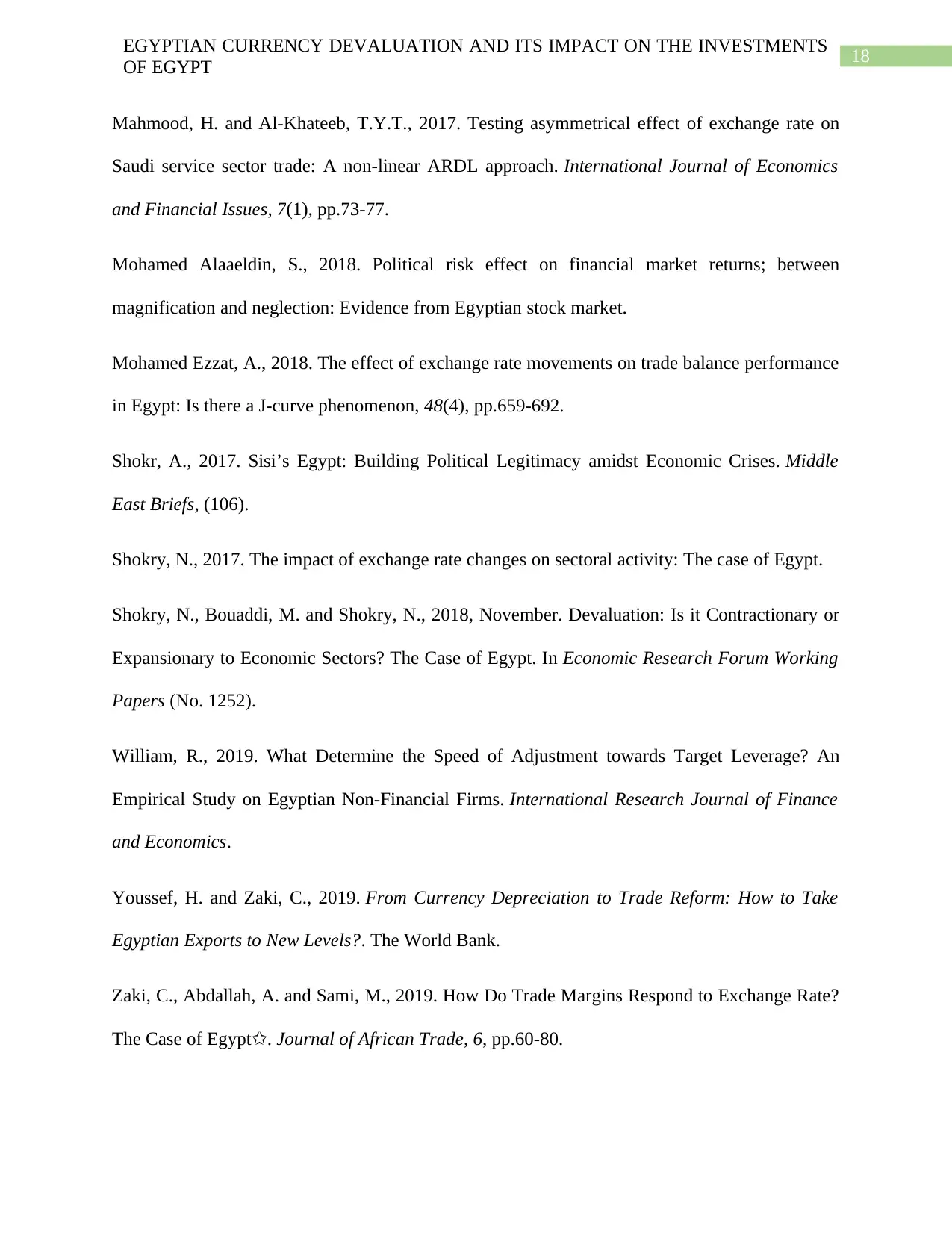
18
EGYPTIAN CURRENCY DEVALUATION AND ITS IMPACT ON THE INVESTMENTS
OF EGYPT
Mahmood, H. and Al-Khateeb, T.Y.T., 2017. Testing asymmetrical effect of exchange rate on
Saudi service sector trade: A non-linear ARDL approach. International Journal of Economics
and Financial Issues, 7(1), pp.73-77.
Mohamed Alaaeldin, S., 2018. Political risk effect on financial market returns; between
magnification and neglection: Evidence from Egyptian stock market.
Mohamed Ezzat, A., 2018. The effect of exchange rate movements on trade balance performance
in Egypt: Is there a J-curve phenomenon, 48(4), pp.659-692.
Shokr, A., 2017. Sisi’s Egypt: Building Political Legitimacy amidst Economic Crises. Middle
East Briefs, (106).
Shokry, N., 2017. The impact of exchange rate changes on sectoral activity: The case of Egypt.
Shokry, N., Bouaddi, M. and Shokry, N., 2018, November. Devaluation: Is it Contractionary or
Expansionary to Economic Sectors? The Case of Egypt. In Economic Research Forum Working
Papers (No. 1252).
William, R., 2019. What Determine the Speed of Adjustment towards Target Leverage? An
Empirical Study on Egyptian Non-Financial Firms. International Research Journal of Finance
and Economics.
Youssef, H. and Zaki, C., 2019. From Currency Depreciation to Trade Reform: How to Take
Egyptian Exports to New Levels?. The World Bank.
Zaki, C., Abdallah, A. and Sami, M., 2019. How Do Trade Margins Respond to Exchange Rate?
The Case of Egypt✩. Journal of African Trade, 6, pp.60-80.
EGYPTIAN CURRENCY DEVALUATION AND ITS IMPACT ON THE INVESTMENTS
OF EGYPT
Mahmood, H. and Al-Khateeb, T.Y.T., 2017. Testing asymmetrical effect of exchange rate on
Saudi service sector trade: A non-linear ARDL approach. International Journal of Economics
and Financial Issues, 7(1), pp.73-77.
Mohamed Alaaeldin, S., 2018. Political risk effect on financial market returns; between
magnification and neglection: Evidence from Egyptian stock market.
Mohamed Ezzat, A., 2018. The effect of exchange rate movements on trade balance performance
in Egypt: Is there a J-curve phenomenon, 48(4), pp.659-692.
Shokr, A., 2017. Sisi’s Egypt: Building Political Legitimacy amidst Economic Crises. Middle
East Briefs, (106).
Shokry, N., 2017. The impact of exchange rate changes on sectoral activity: The case of Egypt.
Shokry, N., Bouaddi, M. and Shokry, N., 2018, November. Devaluation: Is it Contractionary or
Expansionary to Economic Sectors? The Case of Egypt. In Economic Research Forum Working
Papers (No. 1252).
William, R., 2019. What Determine the Speed of Adjustment towards Target Leverage? An
Empirical Study on Egyptian Non-Financial Firms. International Research Journal of Finance
and Economics.
Youssef, H. and Zaki, C., 2019. From Currency Depreciation to Trade Reform: How to Take
Egyptian Exports to New Levels?. The World Bank.
Zaki, C., Abdallah, A. and Sami, M., 2019. How Do Trade Margins Respond to Exchange Rate?
The Case of Egypt✩. Journal of African Trade, 6, pp.60-80.
1 out of 19
Related Documents
Your All-in-One AI-Powered Toolkit for Academic Success.
+13062052269
info@desklib.com
Available 24*7 on WhatsApp / Email
![[object Object]](/_next/static/media/star-bottom.7253800d.svg)
Unlock your academic potential
© 2024 | Zucol Services PVT LTD | All rights reserved.




